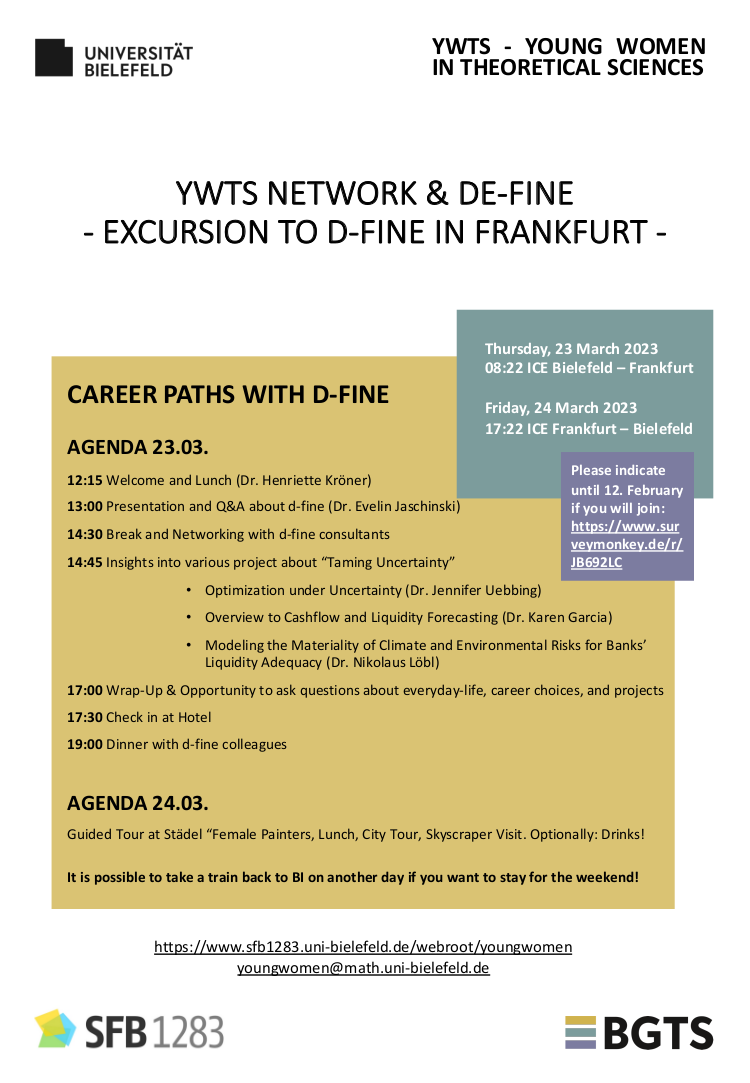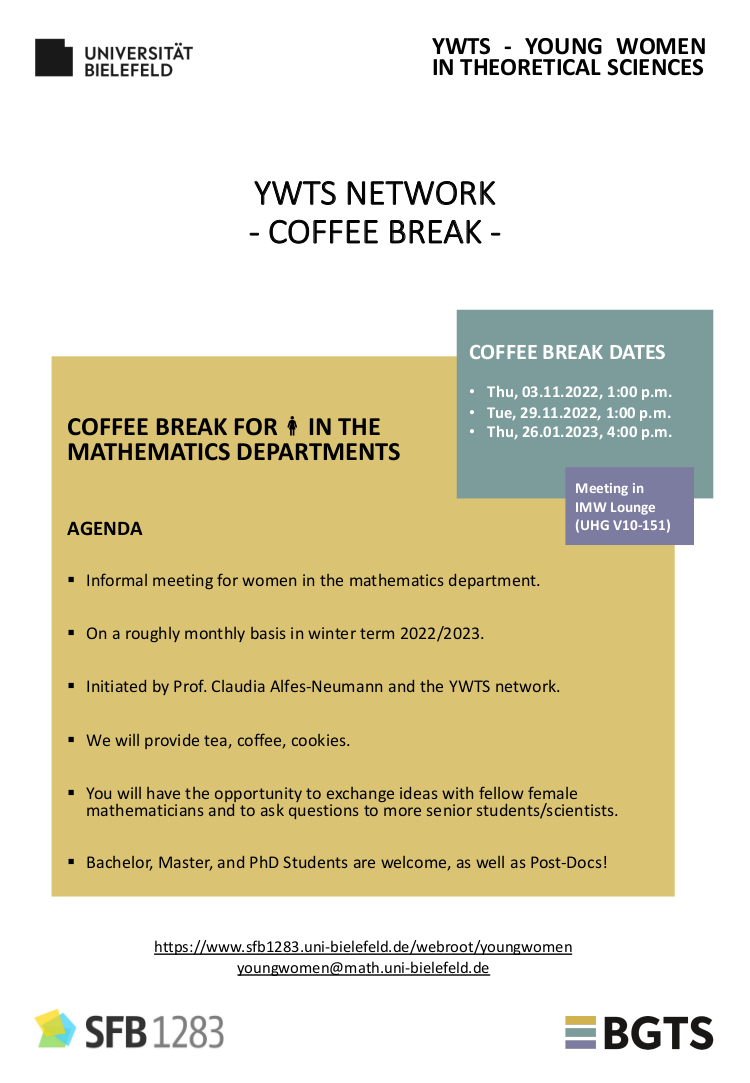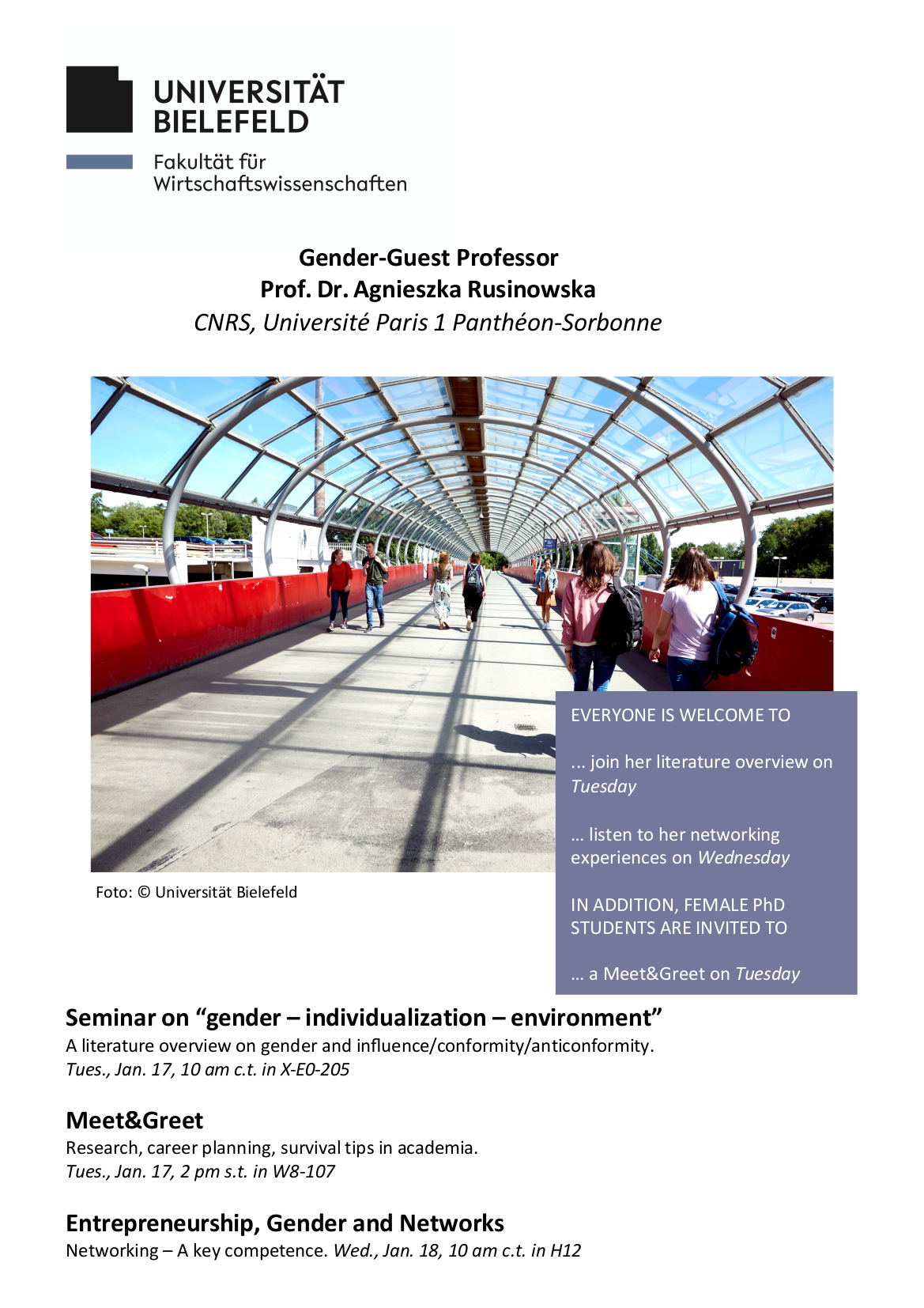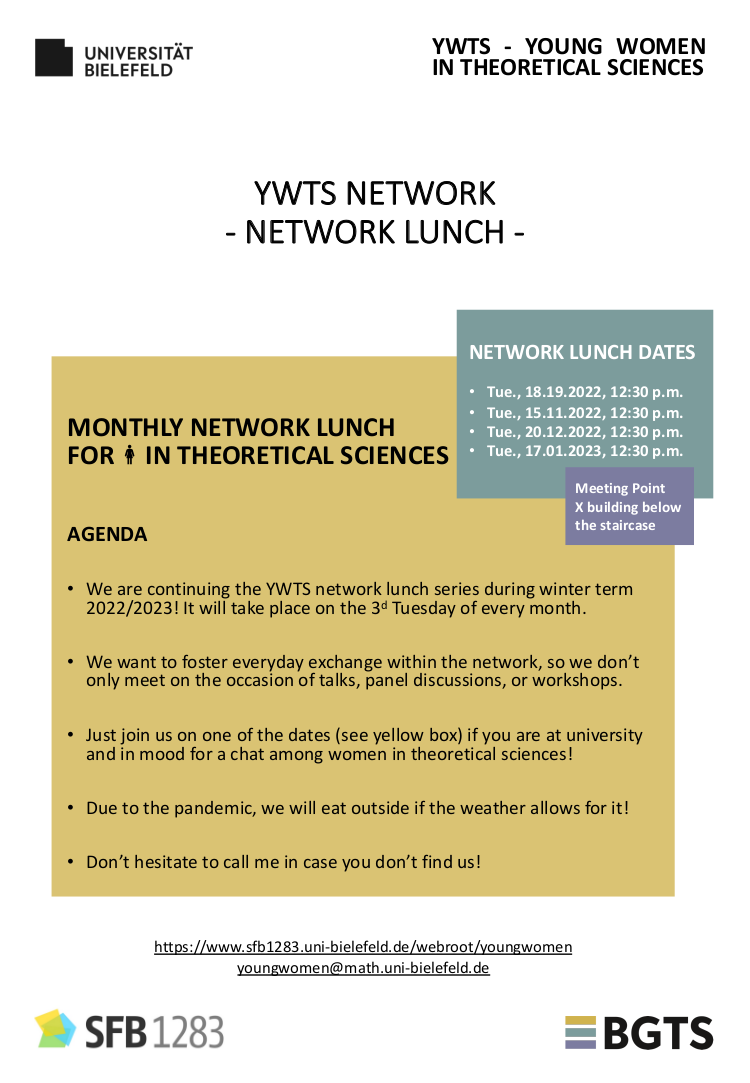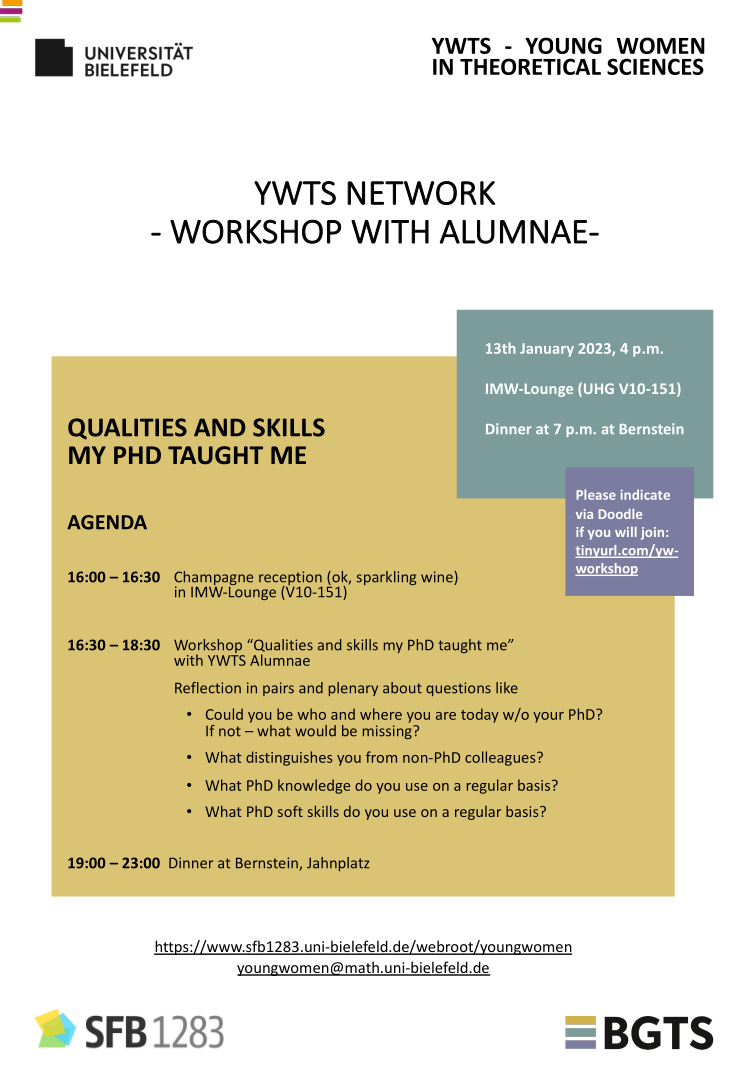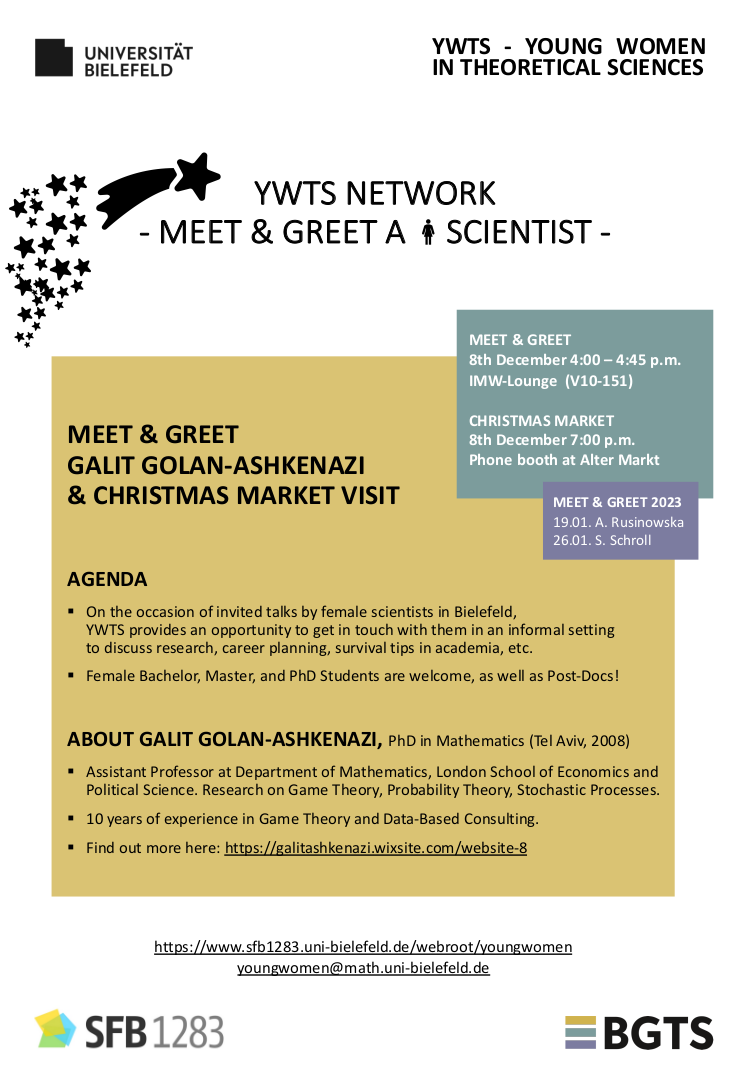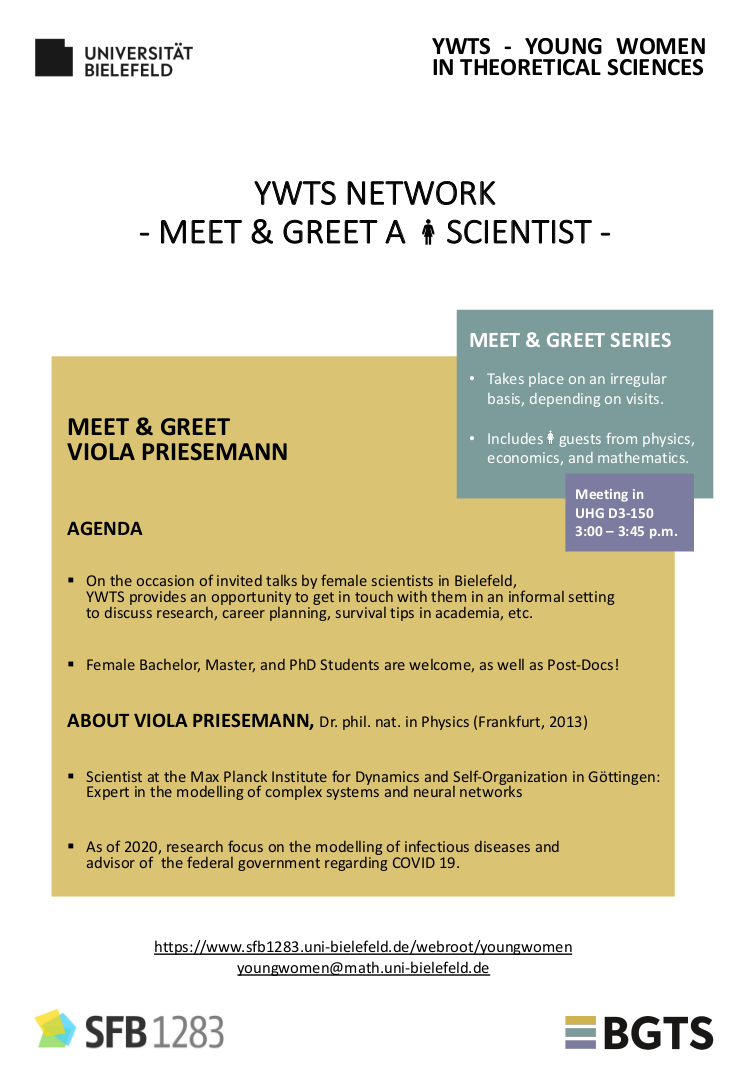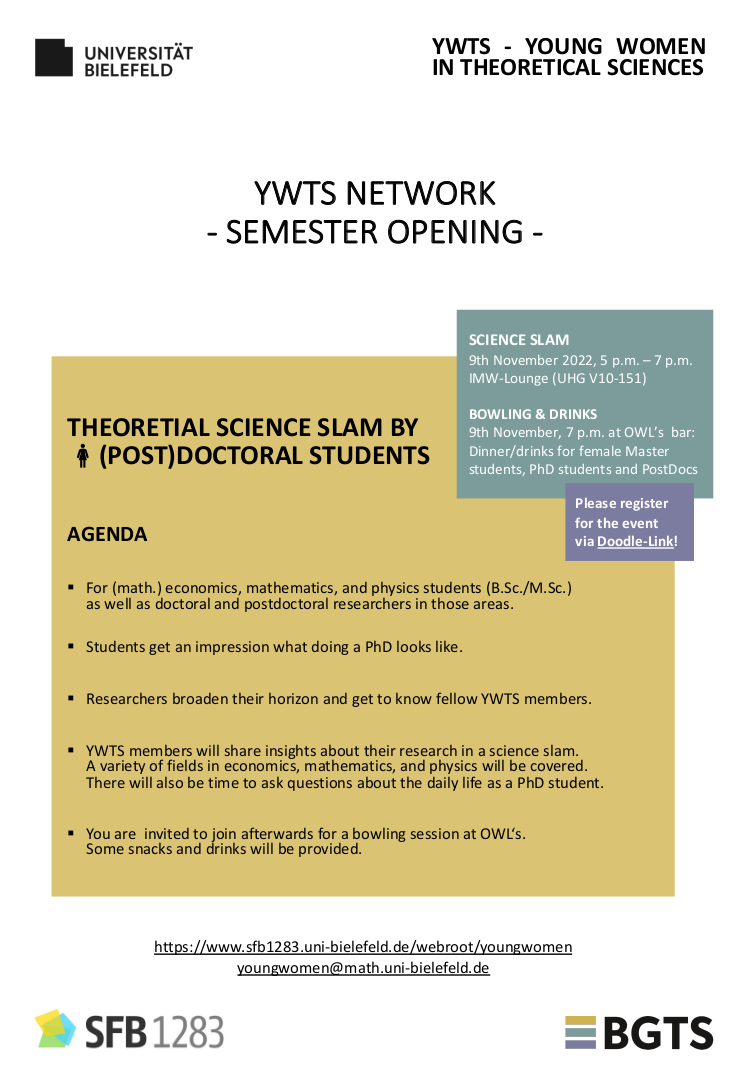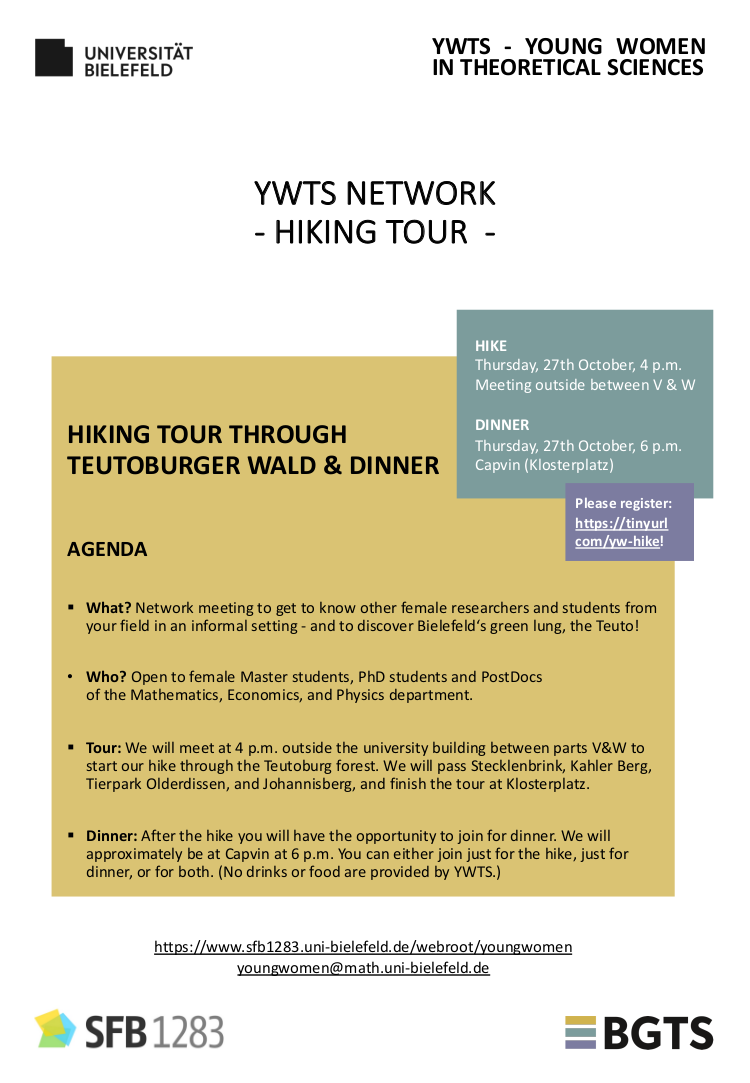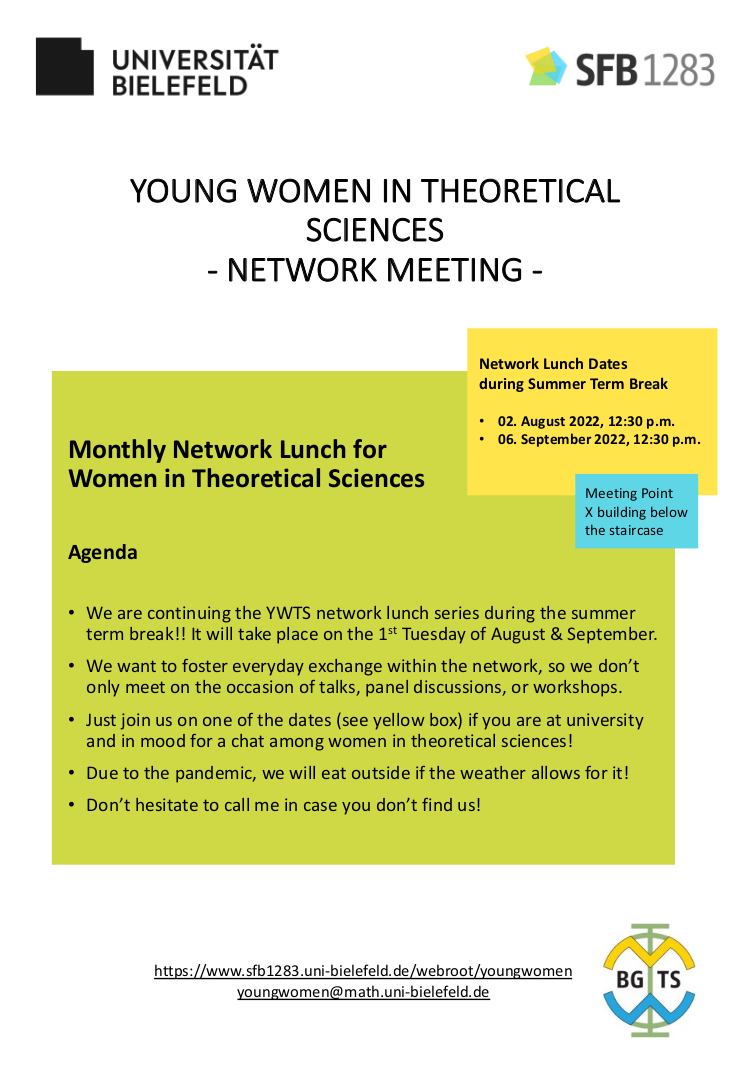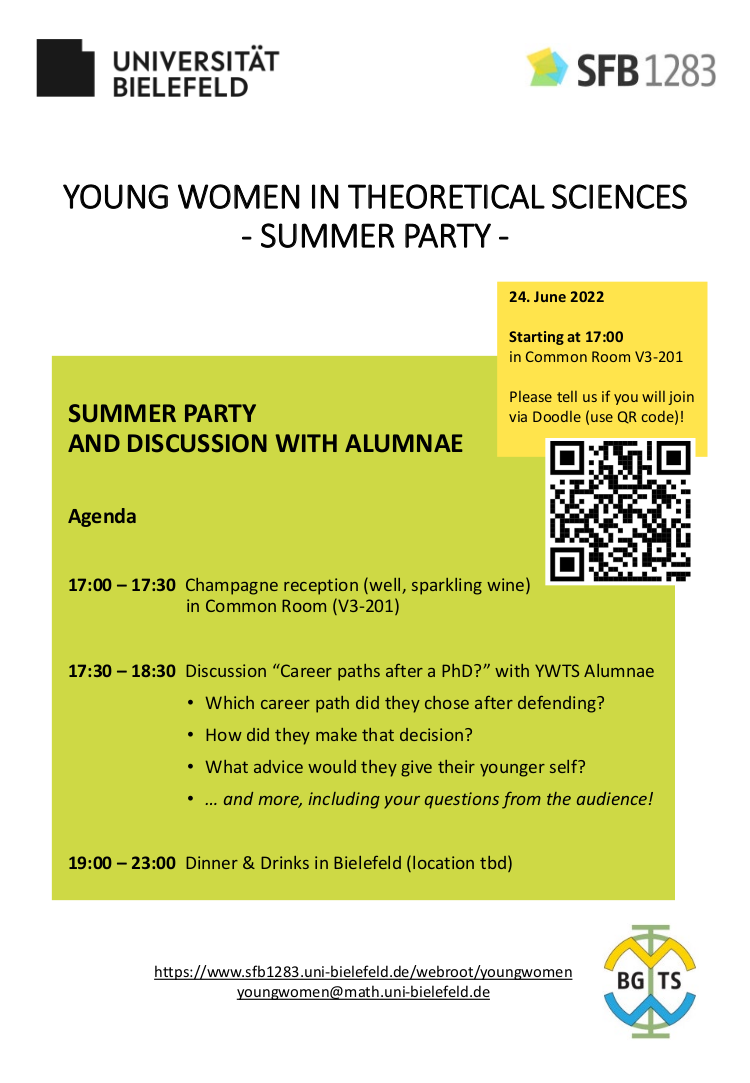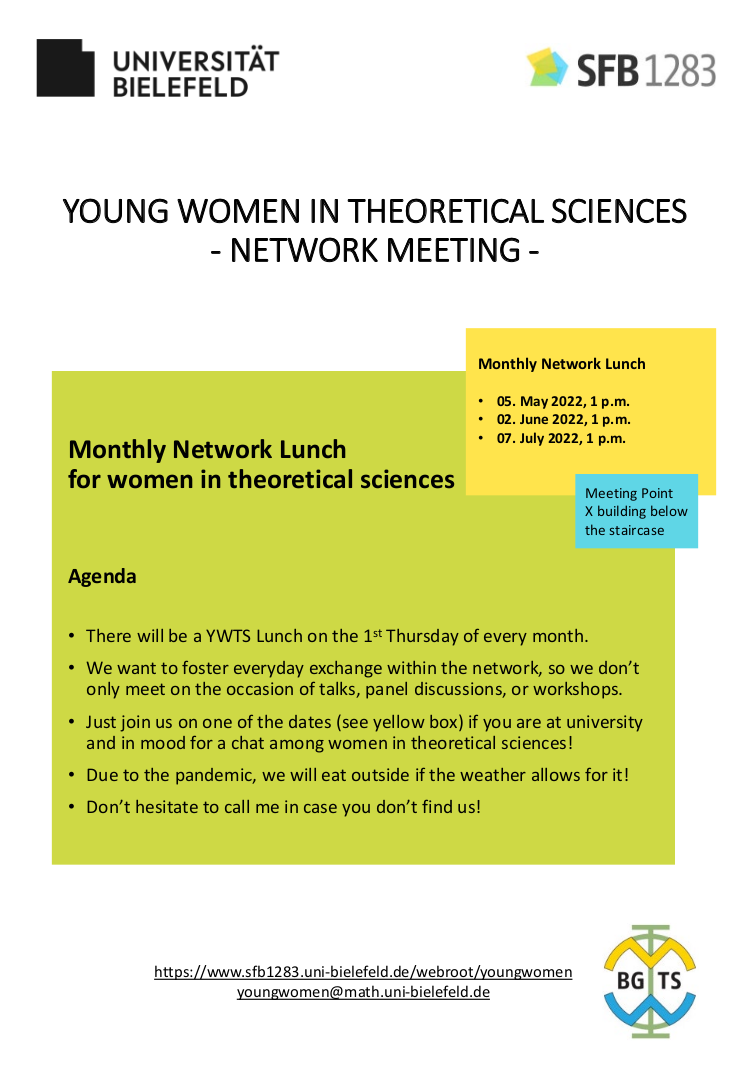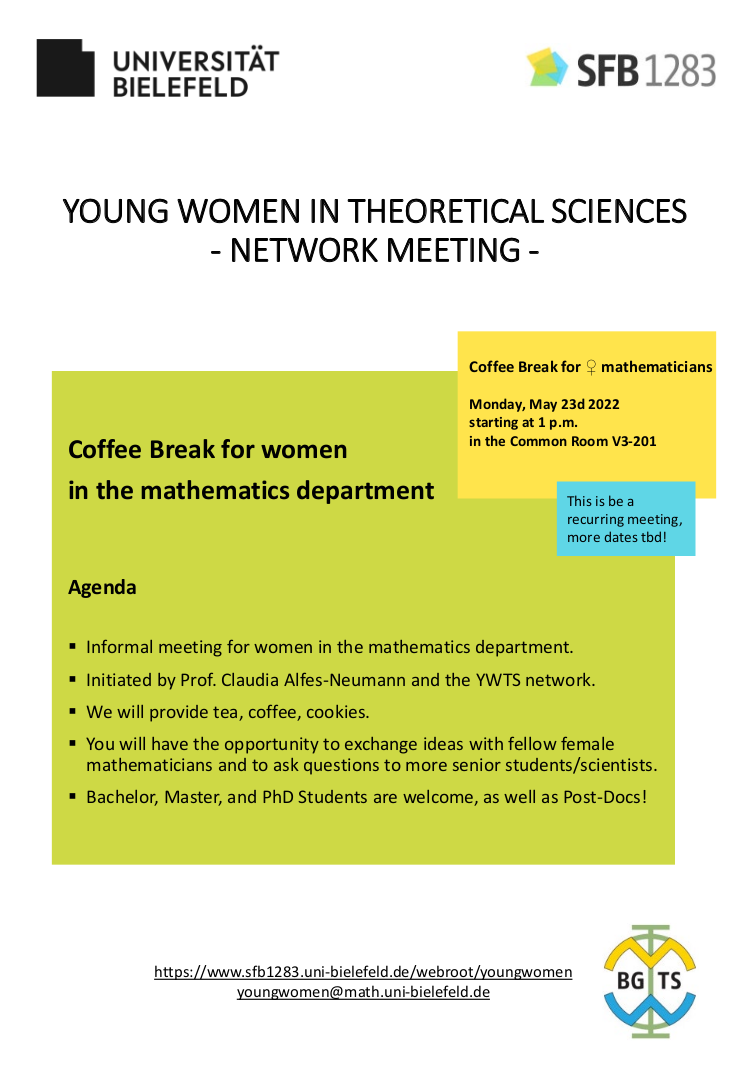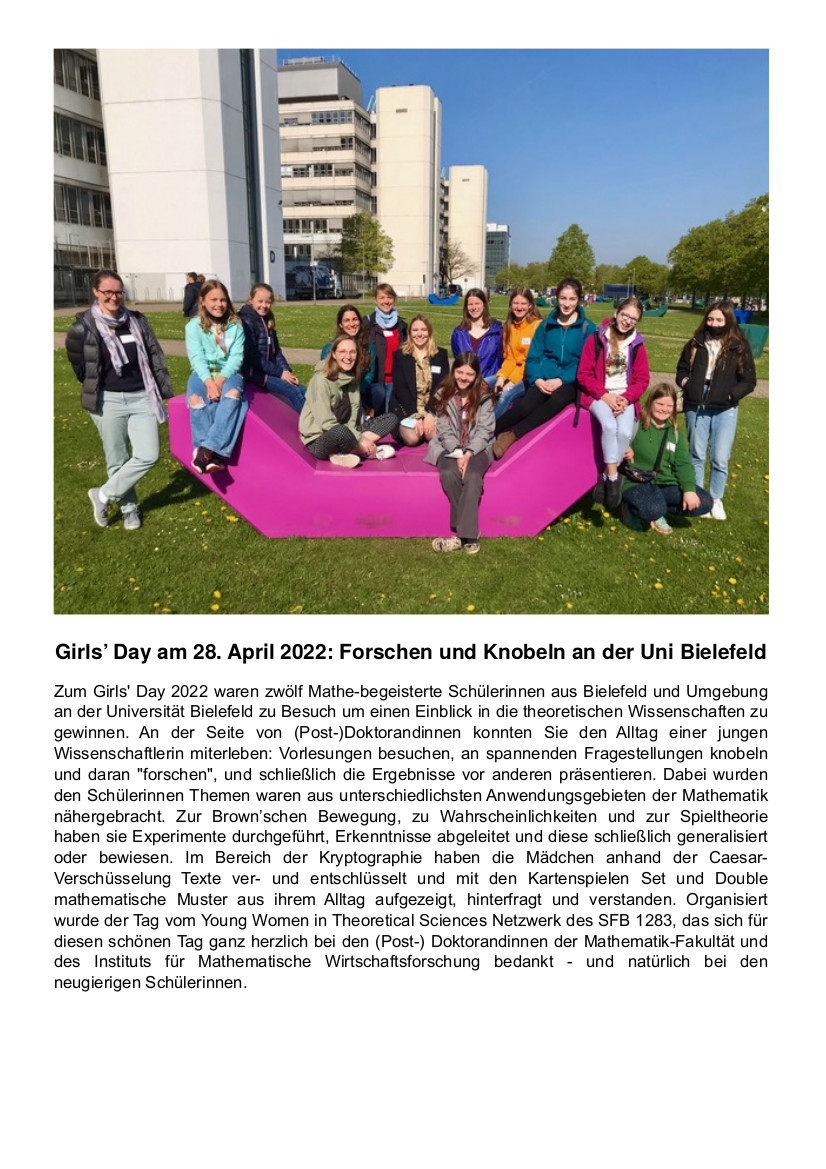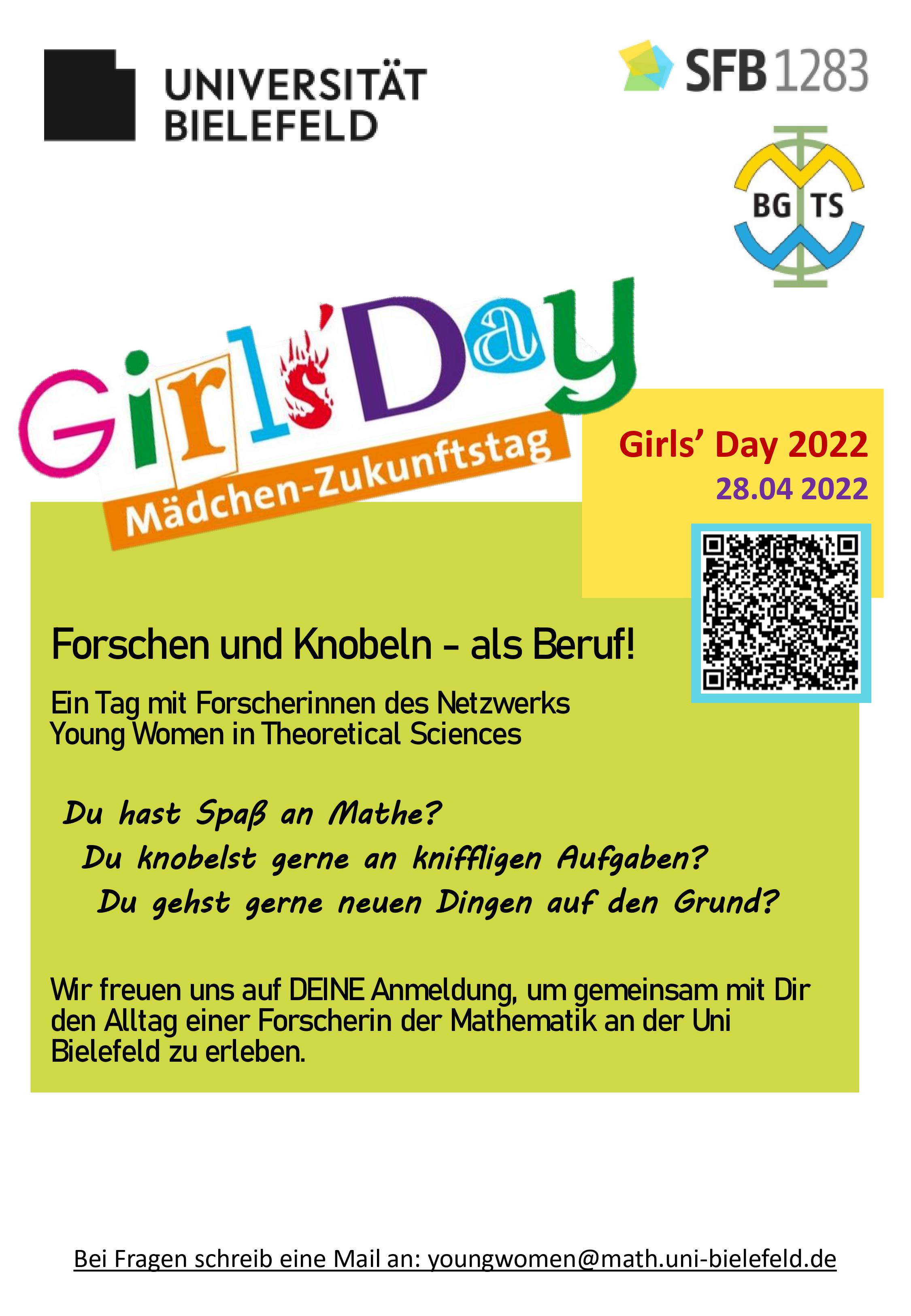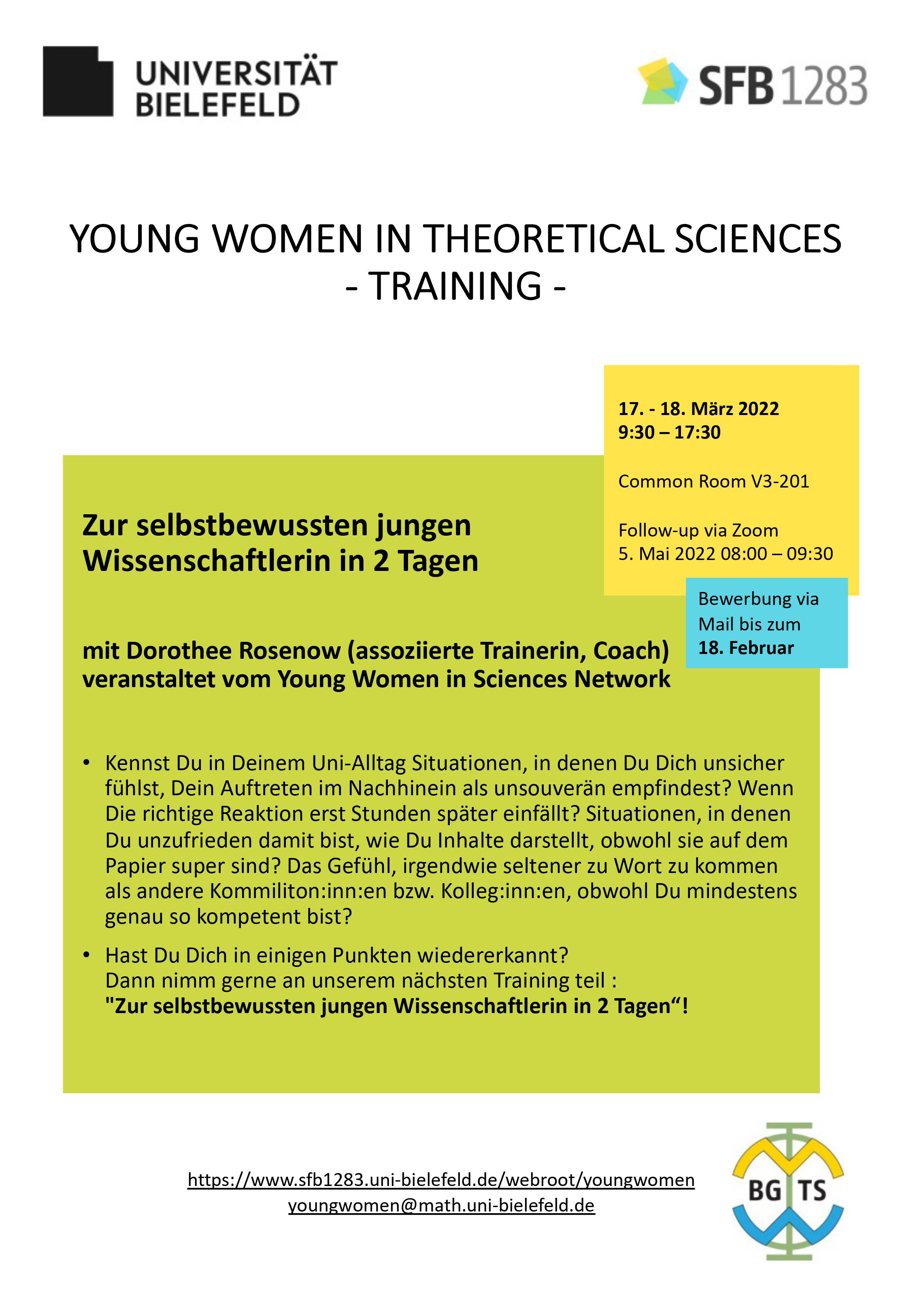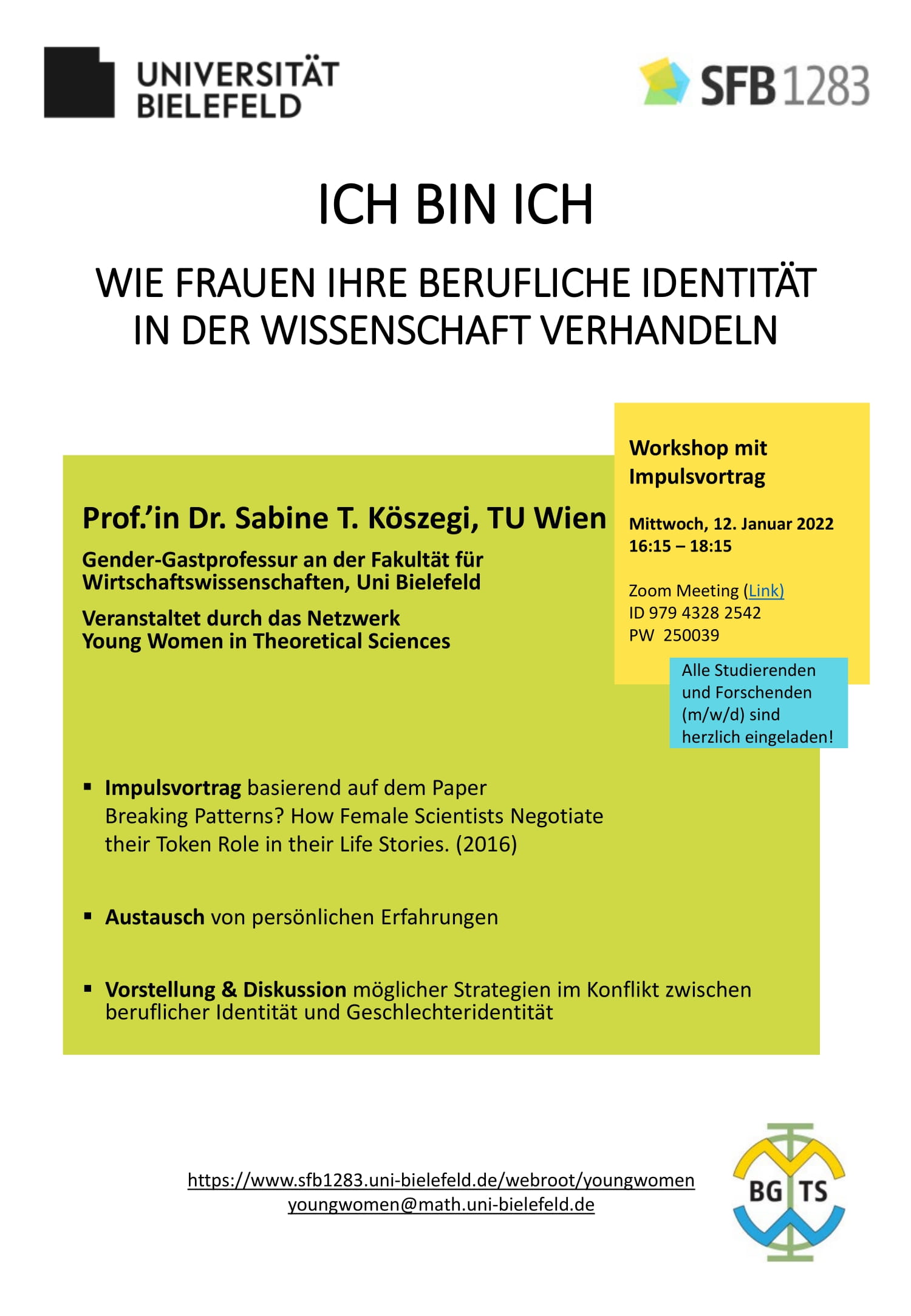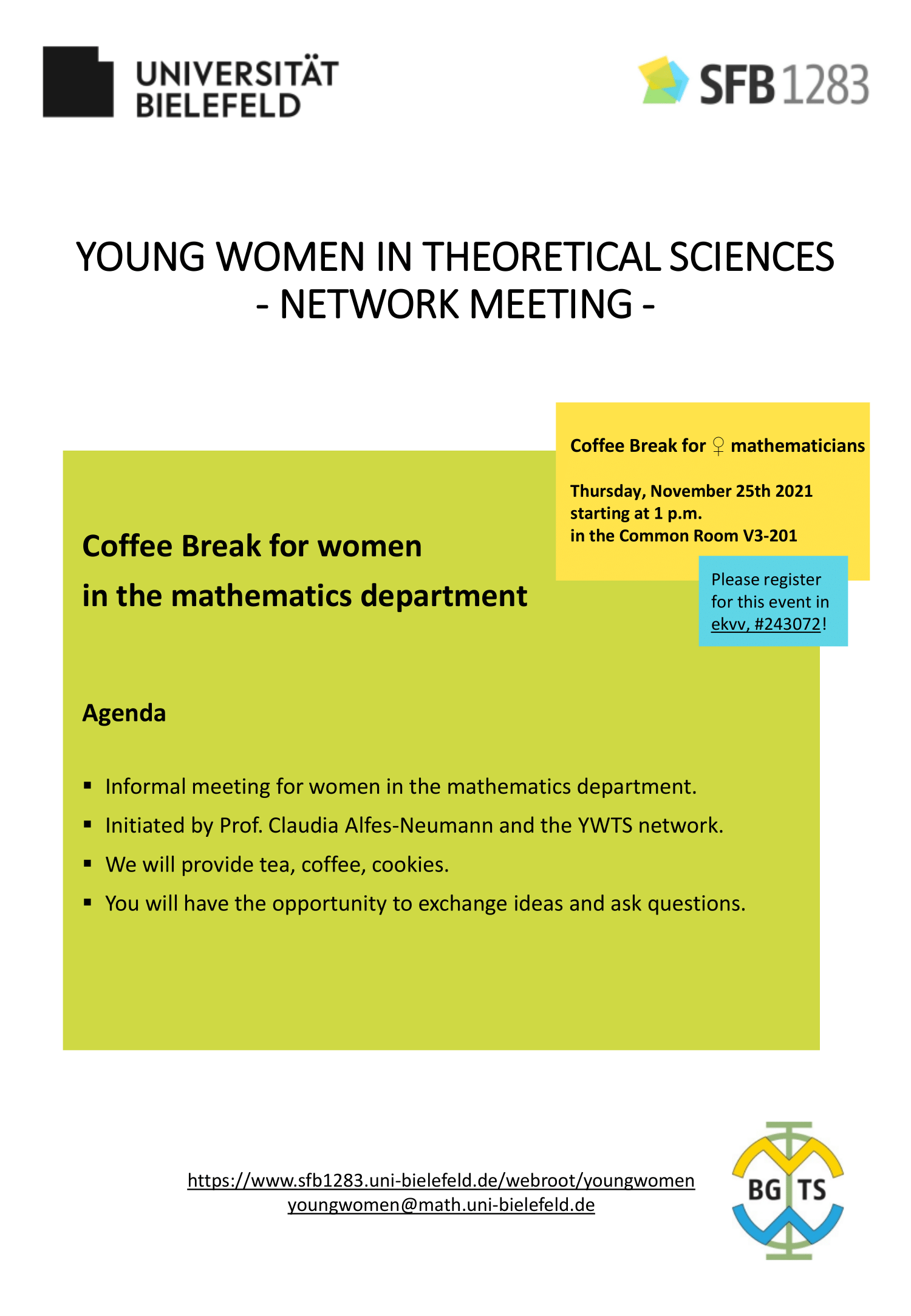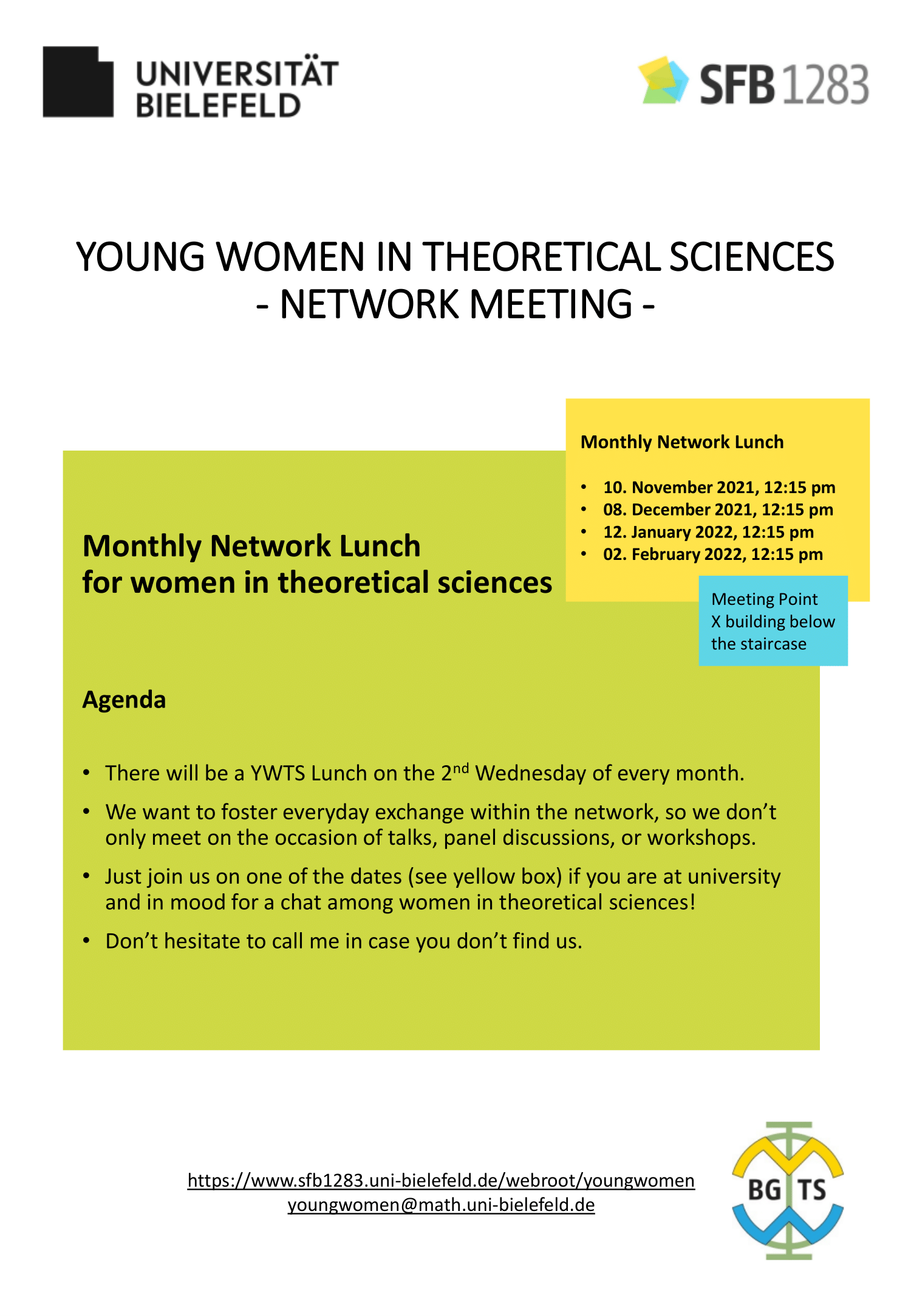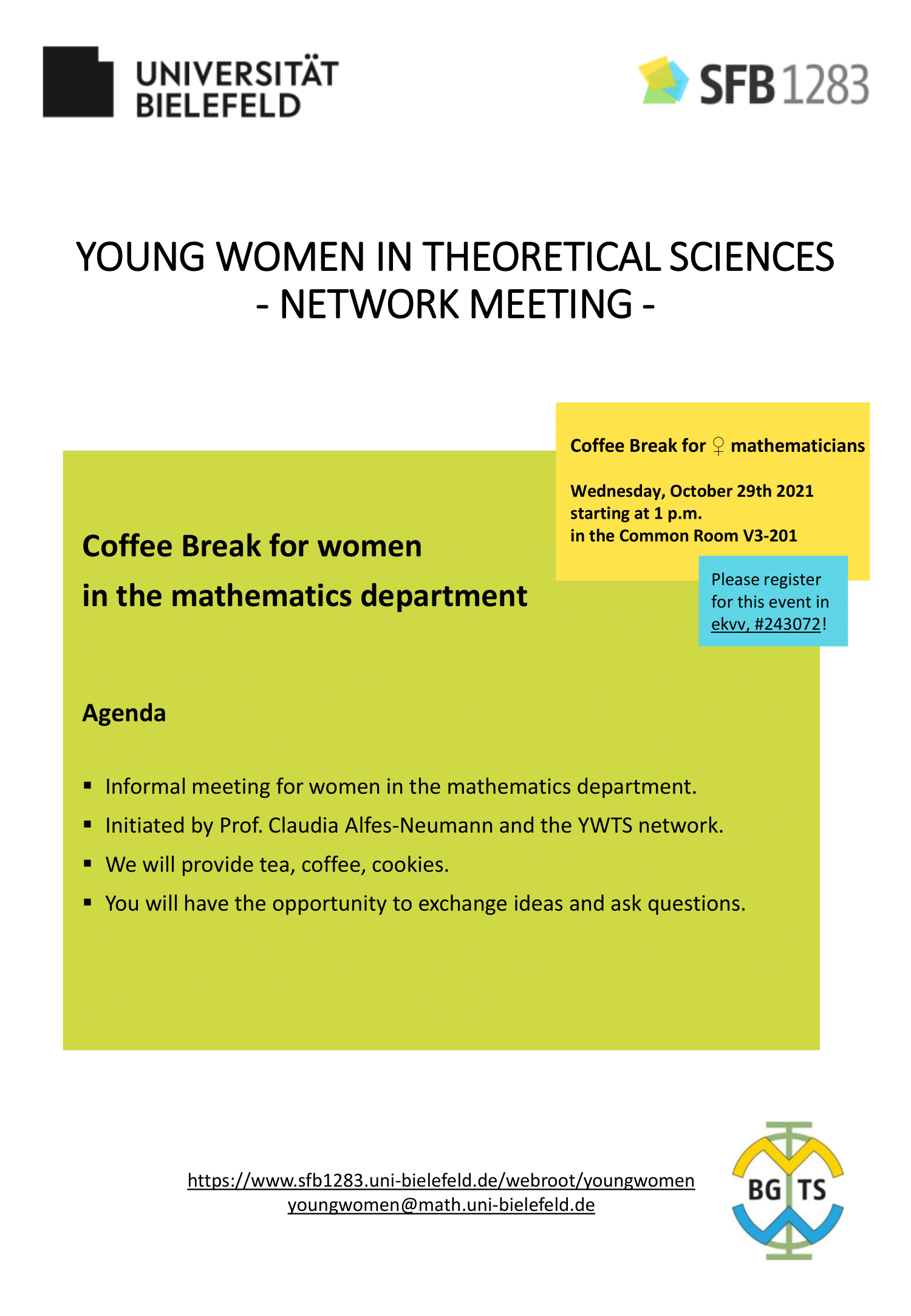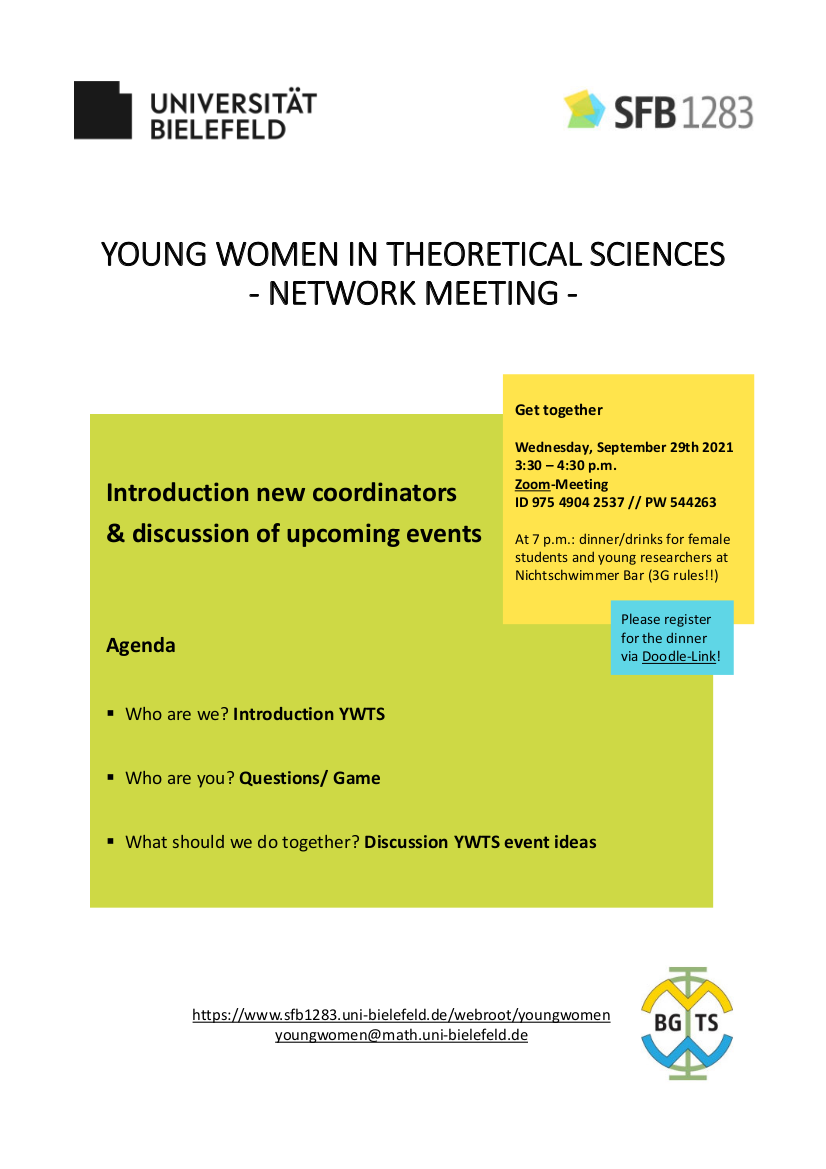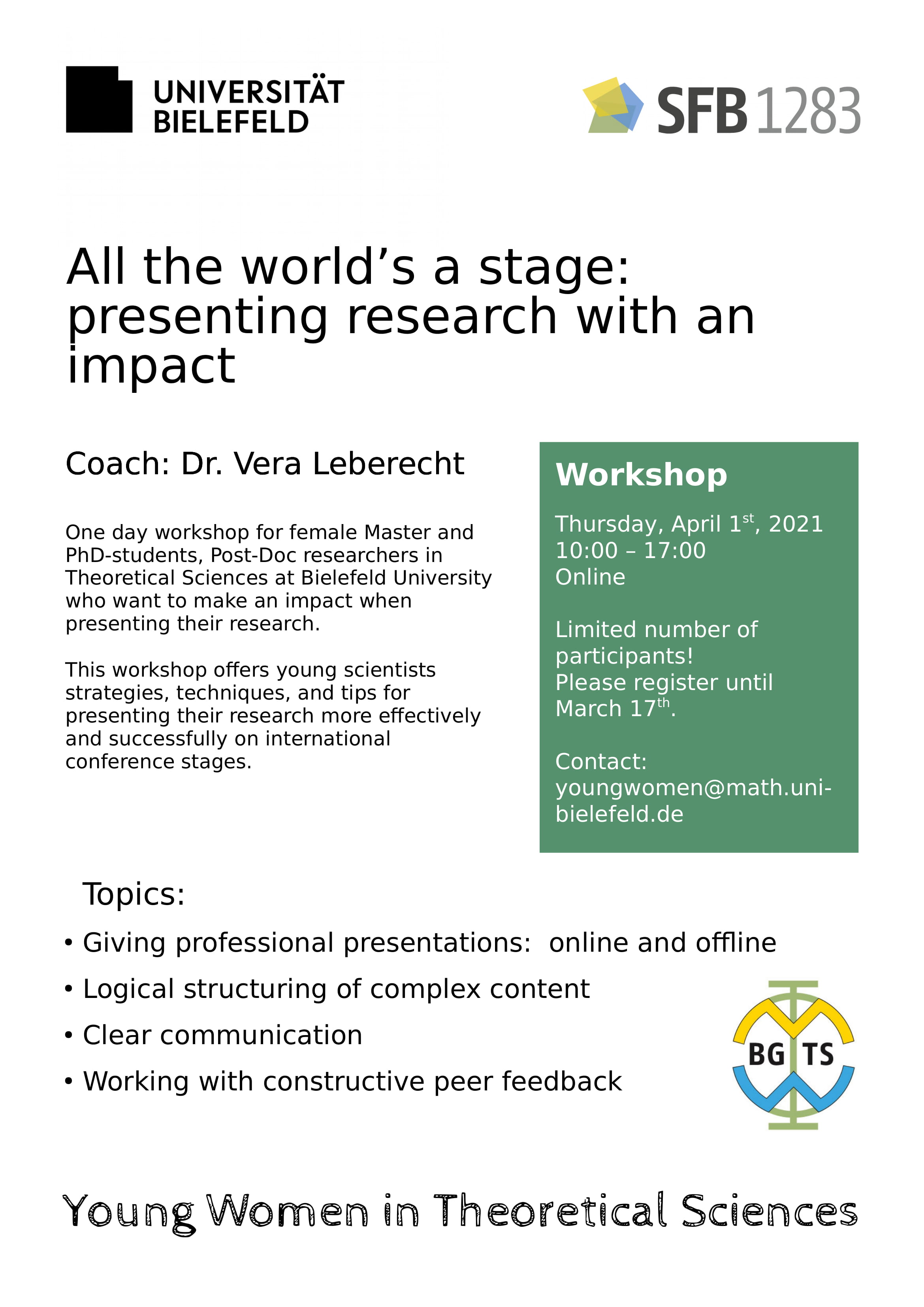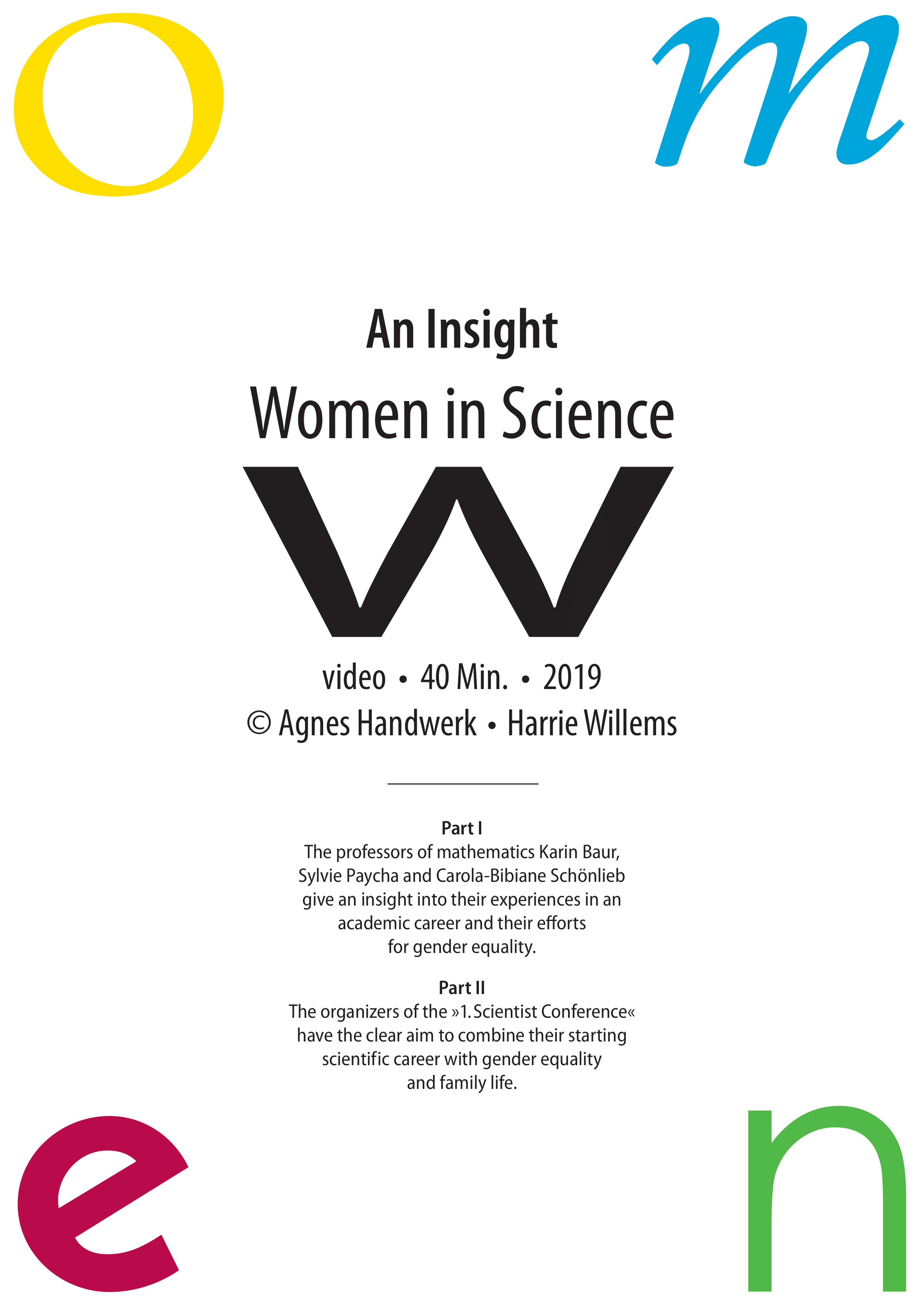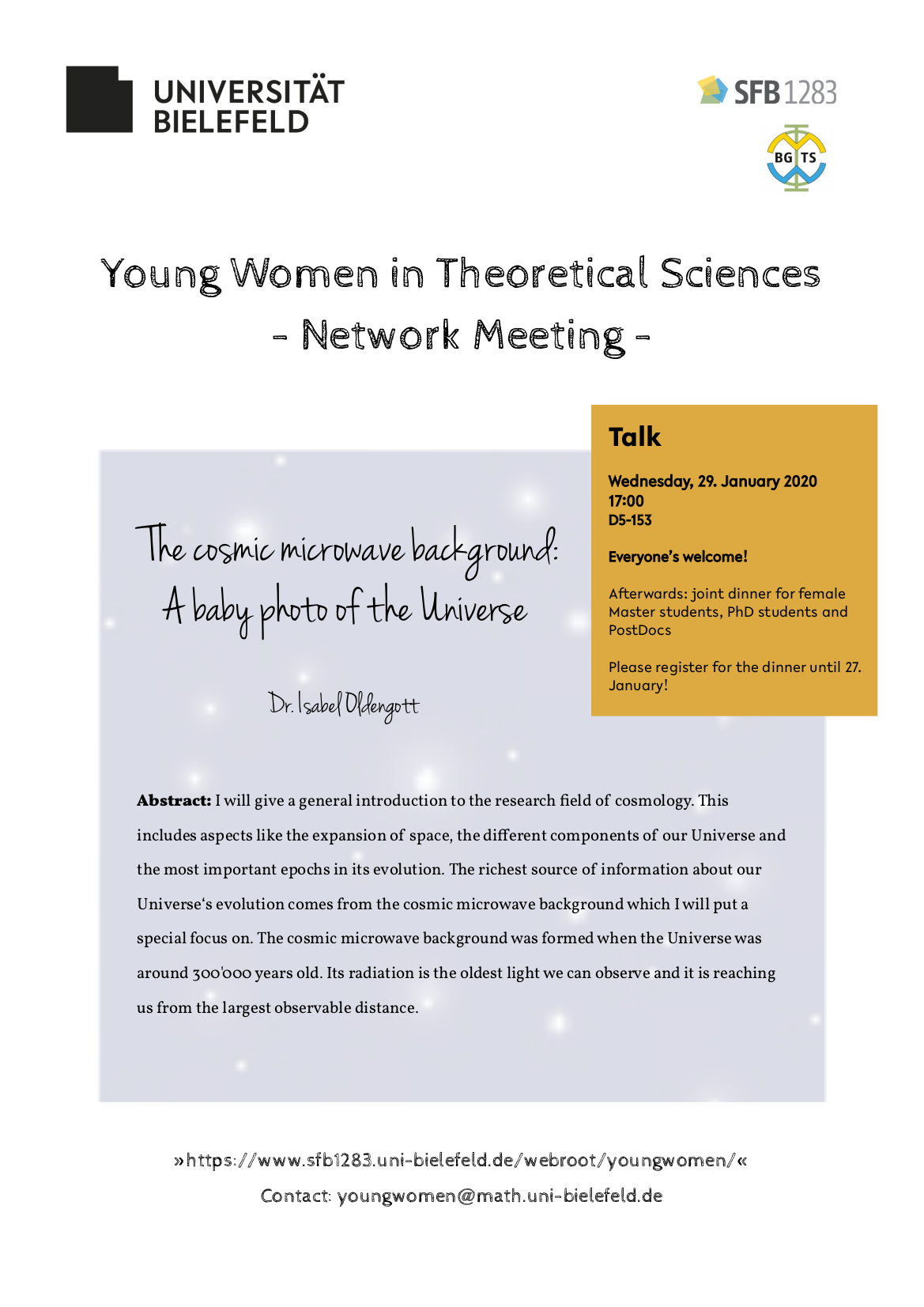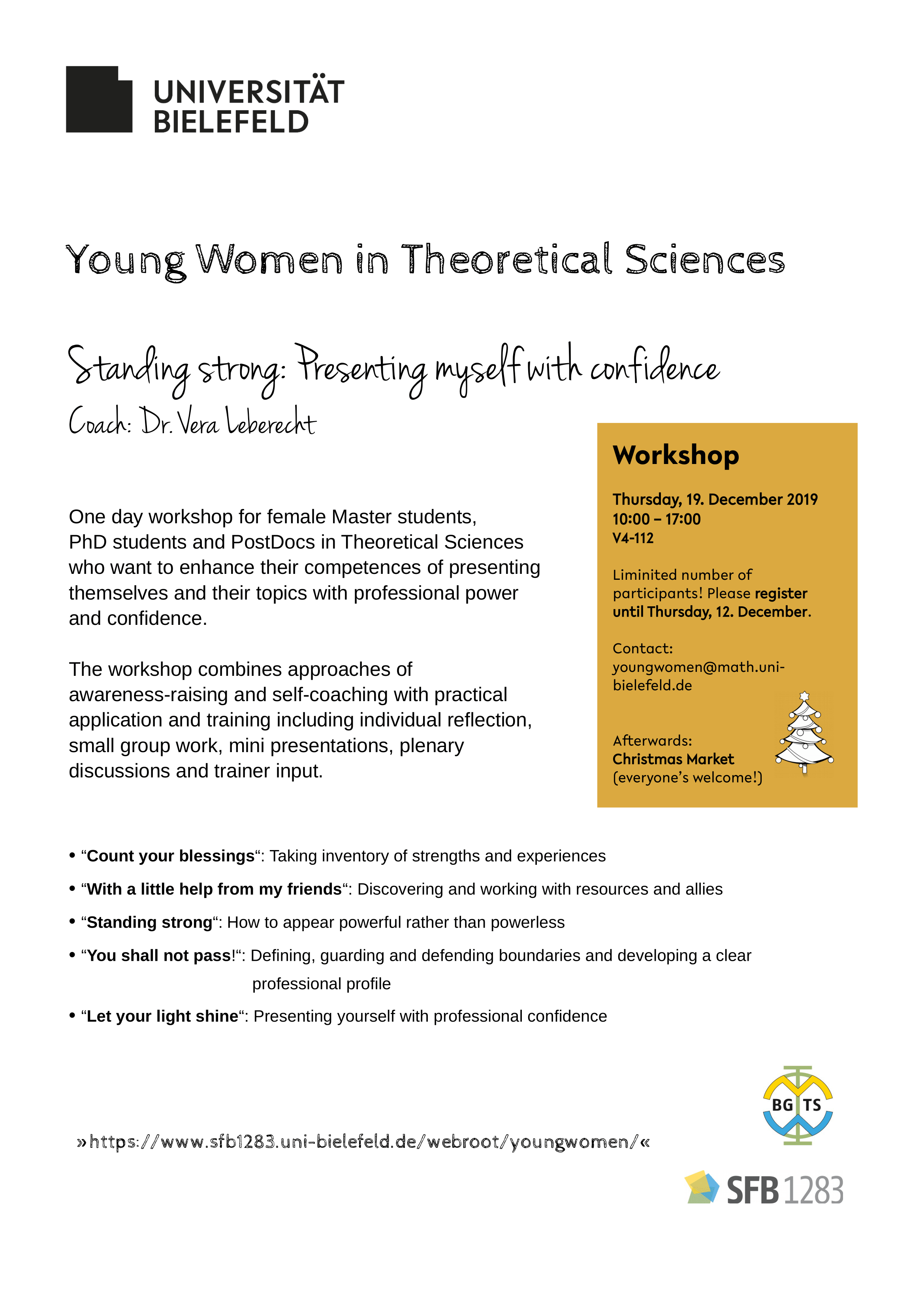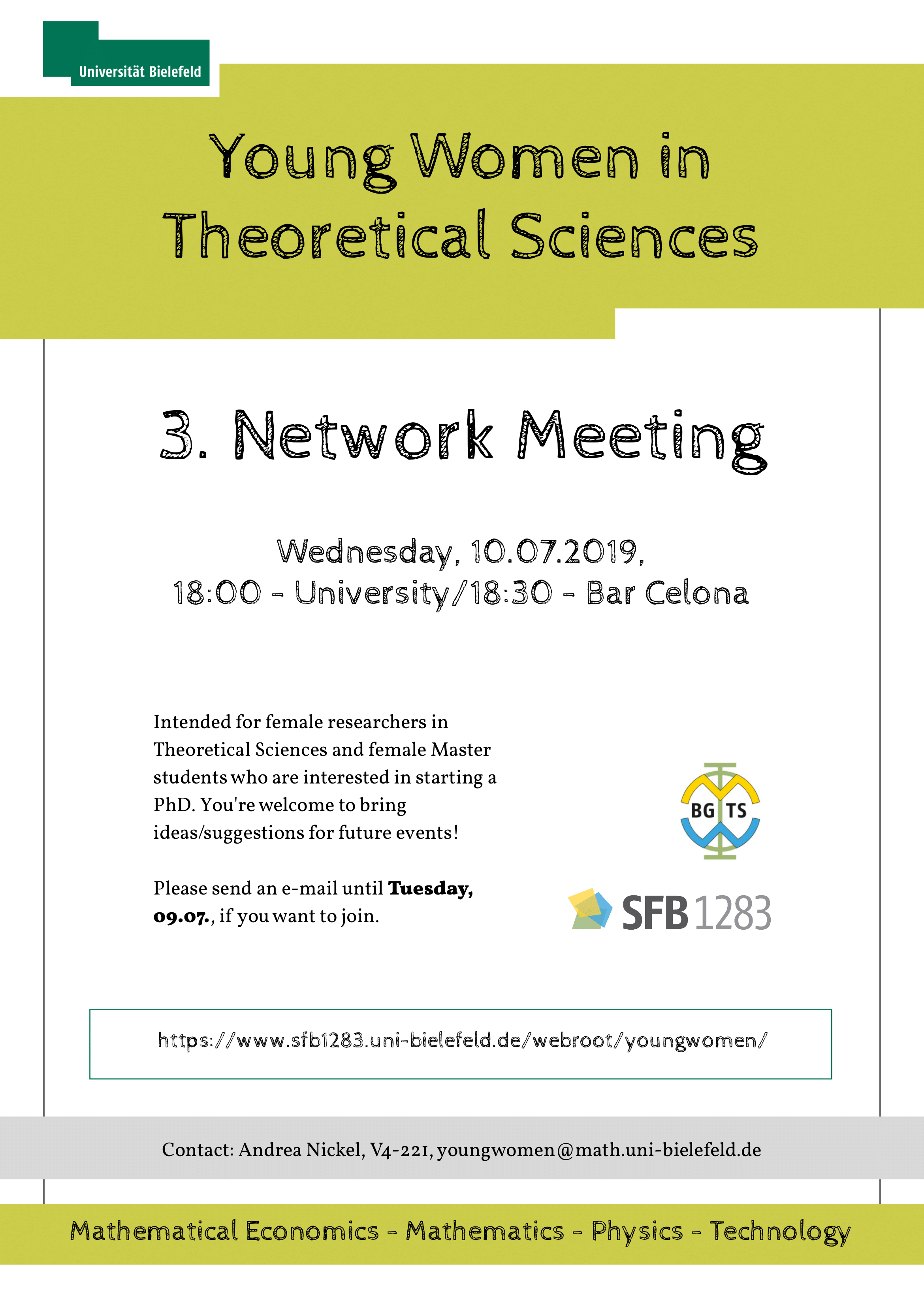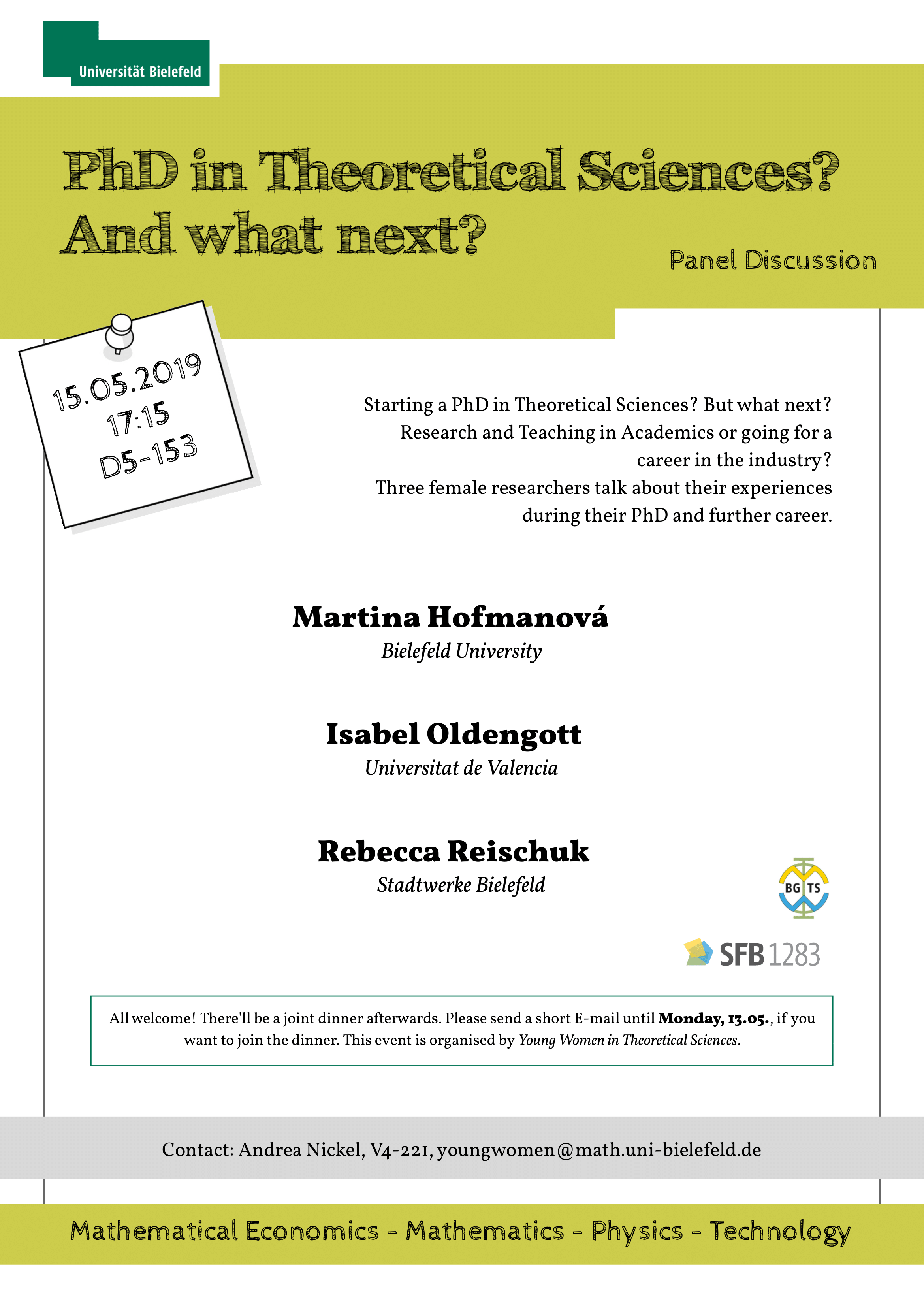

 Blog
Blog
In this Blog, we want to illustrate YWTS Network life by sharing posts about past Meetings & Events. Also, we want to provide information about support for women at Uni Bielefeld outside YWTS, e.g., talks, trainings, or initiatives like the movement program. Finally, we spread news about events for women in Academia outside Uni Bielefeld and new insights into equity. If you know about news, events, or initiatives you deem valid to share here, please reach out to the Network Coordinators.
Show equity news and events for:
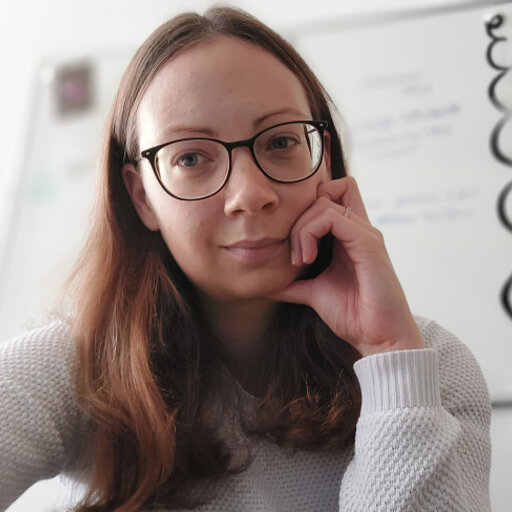
Dr. Lara Gildehaus is a postdoctoral assistant in the field of mathematics didactics at the University of Klagenfurt. She earned her PhD from the University of Paderborn. Her research focuses on mathematics education in secondary schools, teacher education, and teaching and learning in higher education. In summer term 2025, she is serving as the Gender Guest Professor in Bielefeld`s Department of Mathematics. As part of her stay, she gave a colloquium talk on gender and diversity in mathematics education. In addition, she answered pretty much every remaining open question around gender-sensitive teaching in Q&A which was hosted by YWTS and open to male and female junior researchers. Furthermore, she shared insights from her current quest for a tenured positions and how she developed her research agenda as a guest in the YWTS “Meet & Greet” series.
Dr. Lara Gildehaus is a postdoctoral assistant in the field of mathematics didactics at the University of Klagenfurt. She earned her PhD from the University of Paderborn. Her research focuses on mathematics education in secondary schools, teacher education, and teaching and learning in higher education. In summer term 2025, she is serving as the Gender Guest Professor in Bielefeld`s Department of Mathematics. As part of her stay, she gave a colloquium talk on gender and diversity in mathematics education. In addition, she answered pretty much every remaining open question around gender-sensitive teaching in Q&A which was hosted by YWTS and open to male and female junior researchers. Furthermore, she shared insights from her current quest for a tenured positions and how she developed her research agenda as a guest in the YWTS “Meet & Greet” series.

TRR 358, YWTS and Unifilm co-organized a second screening of „Picture a scientist“ in Bielefeld. The movie tells the stories of four women who stand up for equal rights, visibility and diversity in academia; more information here:
TRR 358, YWTS and Unifilm co-organized a second screening of „Picture a scientist“ in Bielefeld. The movie tells the stories of four women who stand up for equal rights, visibility and diversity in academia; more information here:
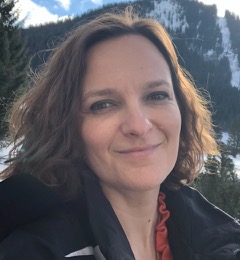
Laura Ciobanu holds the chair for applied algebra at TU Berlin since January 2025 where she works at the confluence of algebra, combinatorics and theoretical computer science. Previously, she was a researcher at Heriot-Watt University in Scotland, at the Centre de Recerca Matemàtica in Barcelona, and at the University of Auckland in New Zealand. She has a degree in mathematics and computer science at Rutgers University in New Jersey.
In Bielefeld, Laura Ciobanu gave a talk in the Mathematics Colloquium titled Equations in groups: between decidability and undecidability. On that occasion she met for coffee with YWTS members from her research field. At the beginning of the Meet & Greet, she gave an insight into the course of her academic career. The discussion revolved around what it was like for her to move to another country or continent on her own immediately after graduating from high school, and what challenges and experiences this entailed. She also talked about her time as a postdoctoral researcher in two institutions on different continents at the same time, and how she organized herself back then. She further shared that the language barrier was one of her biggest hurdles during her stay abroad. Finally, we talked about our experiences as a woman in theoretical sciences, and Laura Ciobanu very openly shared her own perspective.
Laura Ciobanu holds the chair for applied algebra at TU Berlin since January 2025 where she works at the confluence of algebra, combinatorics and theoretical computer science. Previously, she was a researcher at Heriot-Watt University in Scotland, at the Centre de Recerca Matemàtica in Barcelona, and at the University of Auckland in New Zealand. She has a degree in mathematics and computer science at Rutgers University in New Jersey.
In Bielefeld, Laura Ciobanu gave a talk in the Mathematics Colloquium titled Equations in groups: between decidability and undecidability. On that occasion she met for coffee with YWTS members from her research field. At the beginning of the Meet & Greet, she gave an insight into the course of her academic career. The discussion revolved around what it was like for her to move to another country or continent on her own immediately after graduating from high school, and what challenges and experiences this entailed. She also talked about her time as a postdoctoral researcher in two institutions on different continents at the same time, and how she organized herself back then. She further shared that the language barrier was one of her biggest hurdles during her stay abroad. Finally, we talked about our experiences as a woman in theoretical sciences, and Laura Ciobanu very openly shared her own perspective.

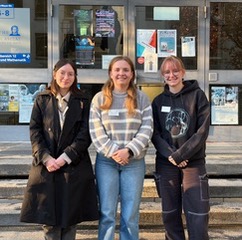
GROW, Graduate Research Opportunities for Women, is a conference for underrepresented gender identities in mathematics, especially women. It is about mathematical research in (and outside) academia and deals with questions like “What to do with a PhD in mathematics?”, “How does mathematical research look like?” or “How to apply for a PhD in mathematics?”, based on panel discussions and research talks. We talked to people from all over the world, some were from India, Iran, the UK, the US or the Netherlands. Therefore, we got an insight into many different perspectives and views on studying mathematics and mathematical research as well as on life in general. For example, we got to learn how studying mathematics or doing a PhD is like in the UK or the US. Apart from that we met people in different positions in academia, PhD students, postdocs and professors. In mathematical context it was very interesting to get to know about different disciplines like tropical geometry or topics like Teichmüller curves or cosmological polytopes as well as formalizing mathematics in LEAN, a proof assistant and (future) mathematical library. The main takeaways from this conference are that being open-minded and not too limited on one topic is very helpful, just like the fact that getting stuck in research is part of the process and quite usual.
GROW, Graduate Research Opportunities for Women, is a conference for underrepresented gender identities in mathematics, especially women. It is about mathematical research in (and outside) academia and deals with questions like “What to do with a PhD in mathematics?”, “How does mathematical research look like?” or “How to apply for a PhD in mathematics?”, based on panel discussions and research talks. We talked to people from all over the world, some were from India, Iran, the UK, the US or the Netherlands. Therefore, we got an insight into many different perspectives and views on studying mathematics and mathematical research as well as on life in general. For example, we got to learn how studying mathematics or doing a PhD is like in the UK or the US. Apart from that we met people in different positions in academia, PhD students, postdocs and professors. In mathematical context it was very interesting to get to know about different disciplines like tropical geometry or topics like Teichmüller curves or cosmological polytopes as well as formalizing mathematics in LEAN, a proof assistant and (future) mathematical library. The main takeaways from this conference are that being open-minded and not too limited on one topic is very helpful, just like the fact that getting stuck in research is part of the process and quite usual.

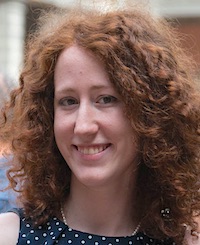
Giada Grossi is a research officer at LAGA (Laboratoire d’Analyse, Géométrie et Applications) at Université Sorbonne Paris Nord. Her research focus lies on Number Theory and Arithmetic Geometry. More specifically, she is interested in Iwasawa theory, Euler systems, special values of L-functions, automorphic forms, and the cohomology of Shimura varieties.
She obtained her PhD from the London School of Geometry and Number Theory and held a postdoctoral position at LAGA funded by FSMP (Fondation Sciences Mathématiques de Paris). Giada is one of the organizers of the London-Paris Number Theory Seminar.
In the YWTS Meet & Greet, we discussed with her how to cope with being the only woman in the room, how it feels to move abroad at an early age, and what impact the pandemic had on one’s life as an academic.
Giada Grossi is a research officer at LAGA (Laboratoire d’Analyse, Géométrie et Applications) at Université Sorbonne Paris Nord. Her research focus lies on Number Theory and Arithmetic Geometry. More specifically, she is interested in Iwasawa theory, Euler systems, special values of L-functions, automorphic forms, and the cohomology of Shimura varieties.
She obtained her PhD from the London School of Geometry and Number Theory and held a postdoctoral position at LAGA funded by FSMP (Fondation Sciences Mathématiques de Paris). Giada is one of the organizers of the London-Paris Number Theory Seminar.
In the YWTS Meet & Greet, we discussed with her how to cope with being the only woman in the room, how it feels to move abroad at an early age, and what impact the pandemic had on one’s life as an academic.

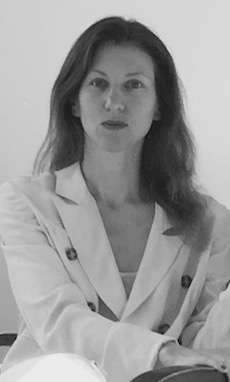
Christina Katt-Pawlowitsch works as an assistant professor in Applied Mathematics at LEMMA (Laboratoire d`Économie Mathématique et de Microéconomie Appliquée) at the University Paris-Panthéon-Assas.
Her research focuses on Game Theory and Evolutionary Game Theory, with a particular interest in solution concepts (equilibrium refinement from both classical and evolutionary perspectives) and applications of game theory to the study of language. She obtained her PhD from the University of Vienna and held several postdoctoral positions at Harvard University and the Paris School of Economics.
In the Meet & Greet, she compared working in Austria, France and the US, talked about being a woman in a male-dominated field, and shared many insights on the French academic job market. Furthermore, we discovered how her research bridges the gap between Bielefeld’s game theorists from IMW and the Biomathematics group.
Christina Katt-Pawlowitsch works as an assistant professor in Applied Mathematics at LEMMA (Laboratoire d`Économie Mathématique et de Microéconomie Appliquée) at the University Paris-Panthéon-Assas.
Her research focuses on Game Theory and Evolutionary Game Theory, with a particular interest in solution concepts (equilibrium refinement from both classical and evolutionary perspectives) and applications of game theory to the study of language. She obtained her PhD from the University of Vienna and held several postdoctoral positions at Harvard University and the Paris School of Economics.
In the Meet & Greet, she compared working in Austria, France and the US, talked about being a woman in a male-dominated field, and shared many insights on the French academic job market. Furthermore, we discovered how her research bridges the gap between Bielefeld’s game theorists from IMW and the Biomathematics group.


Prof. Dr. Gudrun Hiller is the first guest of our Meet & Greet series in winter term 24/25. She holds a chair in theoretical physics at TU Dortmund with a focus on particle and flavour physics.
Over coffee, she shared insights from her academic journey. Her career highlights the importance of working abroad: she describes it as both helpful and necessary for building her expertise and perspective in the field. She further emphasizes the value of having a strong professional network, noting that her connections helped to secure her permanent position at TU Dortmund. When she first joined university, she was the only woman in theoretical physics, and has nevertheless never regretted her choice. Her path is a testament to perseverance and passion for science.
Prof. Dr. Gudrun Hiller is the first guest of our Meet & Greet series in winter term 24/25. She holds a chair in theoretical physics at TU Dortmund with a focus on particle and flavour physics.
Over coffee, she shared insights from her academic journey. Her career highlights the importance of working abroad: she describes it as both helpful and necessary for building her expertise and perspective in the field. She further emphasizes the value of having a strong professional network, noting that her connections helped to secure her permanent position at TU Dortmund. When she first joined university, she was the only woman in theoretical physics, and has nevertheless never regretted her choice. Her path is a testament to perseverance and passion for science.

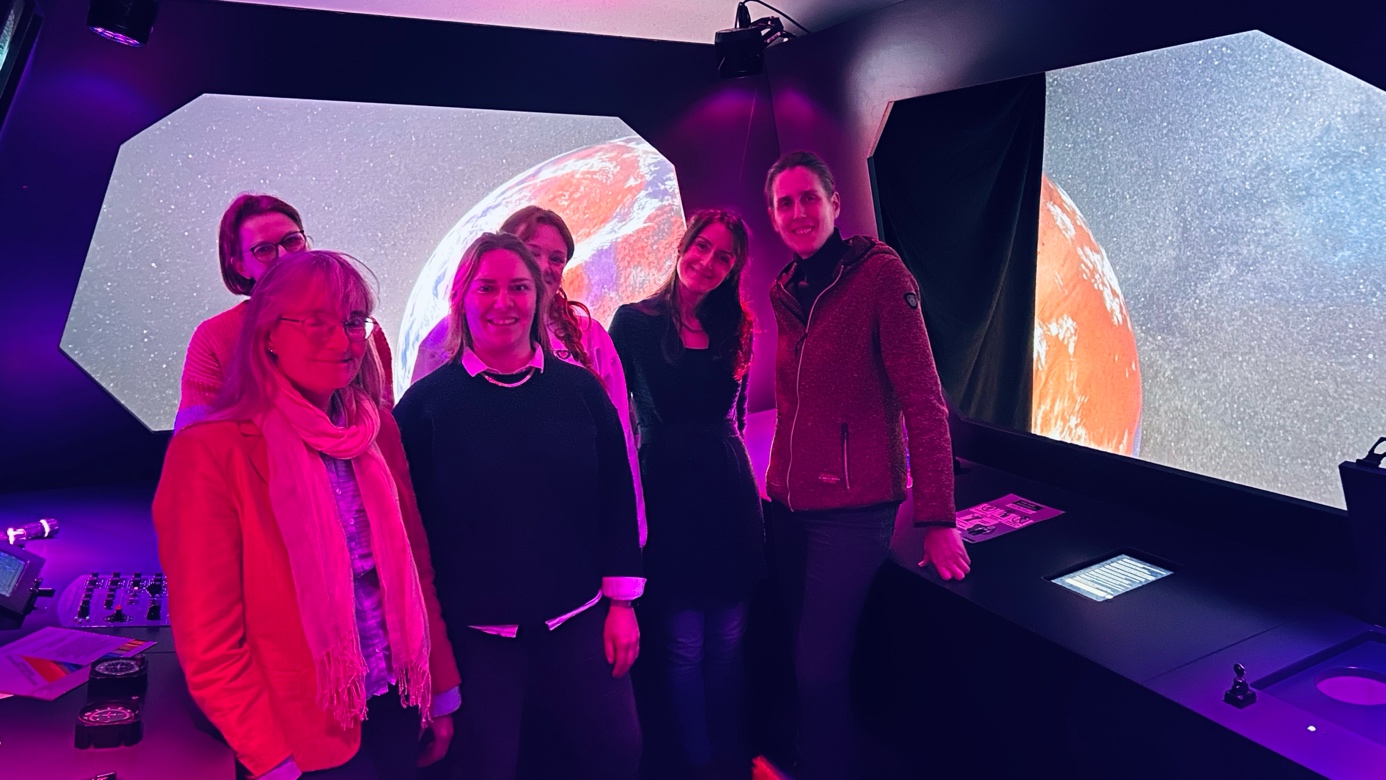
As one member of the YWTS network was part of the team who created the escape room COSMOmission at Wissenswerkstadt Bielefeld, we took that opportunity to try it out. The escape room was themed around a fictional journey to the planet Gaia. We had to solve several scientific puzzles to overcome different challenges we had to face during the journey through the triple star system Alpha Centauri. After successfully arriving at Gaia we visited the Christmas market in Bielefeld and ended the evening with some good food and Glühwein.
As one member of the YWTS network was part of the team who created the escape room COSMOmission at Wissenswerkstadt Bielefeld, we took that opportunity to try it out. The escape room was themed around a fictional journey to the planet Gaia. We had to solve several scientific puzzles to overcome different challenges we had to face during the journey through the triple star system Alpha Centauri. After successfully arriving at Gaia we visited the Christmas market in Bielefeld and ended the evening with some good food and Glühwein.

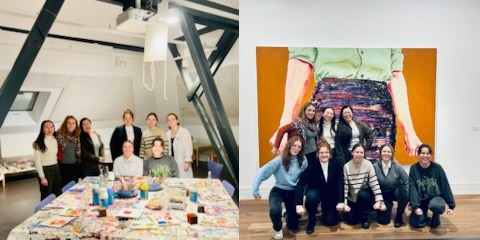
To create an opportunity to get to know (better) fellow female researchers in the economics department, YWTS planned an evening at Kunstforum Hermann Stenner. We began with a guided tour though the exhibition of Cornelius Völker “Guter Stoff” where we were introduced to the artists’ unique approach to everyday objects. The guide offered insides into his creative process as well as different techniques, his inspirations and intentions, which gave us inspiration to create our own art in the art room of the Kunstforum. The painting session was accompanied by wine and talking.
To create an opportunity to get to know (better) fellow female researchers in the economics department, YWTS planned an evening at Kunstforum Hermann Stenner. We began with a guided tour though the exhibition of Cornelius Völker “Guter Stoff” where we were introduced to the artists’ unique approach to everyday objects. The guide offered insides into his creative process as well as different techniques, his inspirations and intentions, which gave us inspiration to create our own art in the art room of the Kunstforum. The painting session was accompanied by wine and talking.

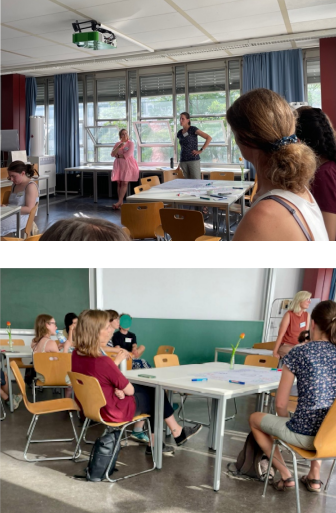
During the workshop Women in Representation Theory, organized by Terese Conde and Julia Sauter, YWTS hosted a discussion on the representation of women in Mathematics. Participants of the workshop together and members of the network discussed the challenges women face in Mathematics and how they navigate their careers in such environments.
A key part of the workshop was a World Café conversation, a structured dialogue format that encourages open, informal discussions in small groups. The conversation was initiated by Dr. Sabine Schäfer, a sociologist specializing in gender studies, who explained the scientific aspects of gender bias. Participants then shared their experiences and challenges, and explored how these issues affect their professional lives.
A common point was the difference between working in women-only environments and typical male-dominated workplaces, and the need for women to adapt.
Many participants felt that women-only spaces allowed them to be themselves and felt more democratic. These environments fostered a sense of comfort and mutual understanding that science should adapt to the presence of women, not the other way around.
Diversity, another important theme, was recognized as a strength. Womens unique perspectives often lead to more creative problem solving in mathematics. Participants agreed that diverse teams - whether in terms of gender, background or thinking style - bring fresh ideas and enhance progress in the field. However, many felt that systemic barriers such as unconscious bias and exclusionary cultures still prevent women from fully thriving in mathematics.
During the workshop Women in Representation Theory, organized by Terese Conde and Julia Sauter, YWTS hosted a discussion on the representation of women in Mathematics. Participants of the workshop together and members of the network discussed the challenges women face in Mathematics and how they navigate their careers in such environments.
A key part of the workshop was a World Café conversation, a structured dialogue format that encourages open, informal discussions in small groups. The conversation was initiated by Dr. Sabine Schäfer, a sociologist specializing in gender studies, who explained the scientific aspects of gender bias. Participants then shared their experiences and challenges, and explored how these issues affect their professional lives.
A common point was the difference between working in women-only environments and typical male-dominated workplaces, and the need for women to adapt.
Many participants felt that women-only spaces allowed them to be themselves and felt more democratic. These environments fostered a sense of comfort and mutual understanding that science should adapt to the presence of women, not the other way around.
Diversity, another important theme, was recognized as a strength. Womens unique perspectives often lead to more creative problem solving in mathematics. Participants agreed that diverse teams - whether in terms of gender, background or thinking style - bring fresh ideas and enhance progress in the field. However, many felt that systemic barriers such as unconscious bias and exclusionary cultures still prevent women from fully thriving in mathematics.

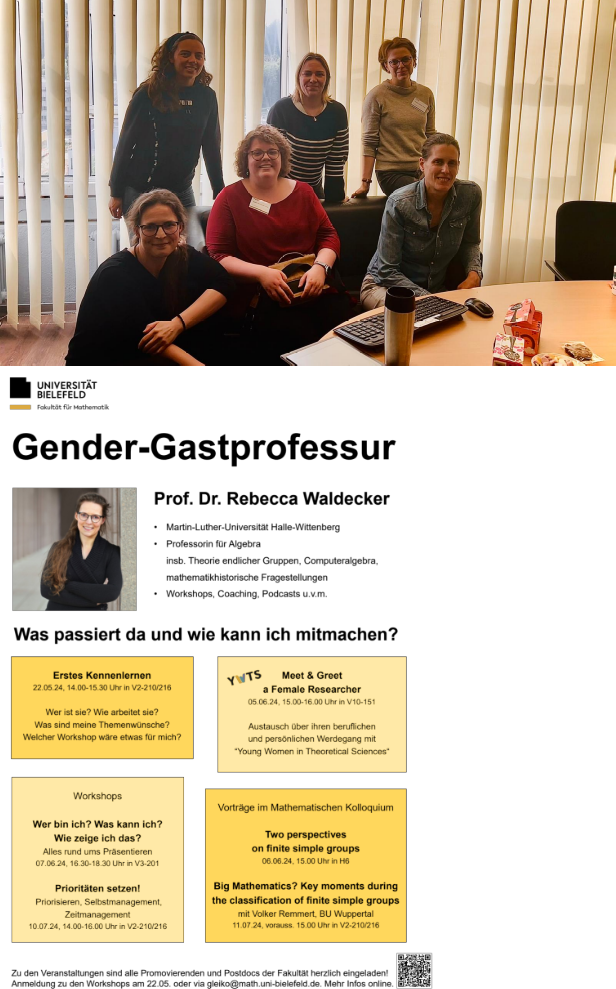
Prof. Dr. Rebecca Waldecker is a professor of algebra at Martin Luther University Halle-Wittenberg. She holds a PhD in mathematics from the University of Kiel, specializing in group theory. Her research interests include computer algebra and the theory of finite groups.
As the gender guest professor at the mathematics faculty in summer 2024, she organized several events next to her teaching in Bielefeld, such as the training sessions ‚Who am I? What am I Capable of? How can I Show That?‘ and ‚Priorities and Self Management’, the workshop “Am I an impostor?” during the BGTS Doctoral Day, and individual coachings.
Rebecca Waldecker also participated in the YWTS Meet & Greet series. There, she shared insights about her academic career, how she became a researcher, and how she – impressingly - became a coach and a podcast host on top of that. (Check out her website to discover her diverse outreach, e.g., a book for first semester math students, a blog, a podcast about her classes and with chats with fellow researchers, or her junior research group on group theory “Das Grüppchen”.) We asked for her secret how she can be so driven and productive: by doing what you love! She also opened up about moments of doubt, e.g., when she was asked to accept a lecturer position including a mathematical topic that was not part of her formal education. She managed to say yes and have confidence in herself because she had someone trusted telling her “You can handle this!”
Prof. Dr. Rebecca Waldecker is a professor of algebra at Martin Luther University Halle-Wittenberg. She holds a PhD in mathematics from the University of Kiel, specializing in group theory. Her research interests include computer algebra and the theory of finite groups.
As the gender guest professor at the mathematics faculty in summer 2024, she organized several events next to her teaching in Bielefeld, such as the training sessions ‚Who am I? What am I Capable of? How can I Show That?‘ and ‚Priorities and Self Management’, the workshop “Am I an impostor?” during the BGTS Doctoral Day, and individual coachings.
Rebecca Waldecker also participated in the YWTS Meet & Greet series. There, she shared insights about her academic career, how she became a researcher, and how she – impressingly - became a coach and a podcast host on top of that. (Check out her website to discover her diverse outreach, e.g., a book for first semester math students, a blog, a podcast about her classes and with chats with fellow researchers, or her junior research group on group theory “Das Grüppchen”.) We asked for her secret how she can be so driven and productive: by doing what you love! She also opened up about moments of doubt, e.g., when she was asked to accept a lecturer position including a mathematical topic that was not part of her formal education. She managed to say yes and have confidence in herself because she had someone trusted telling her “You can handle this!”

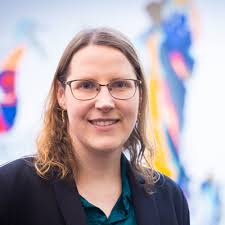
Prof. Dr. Cora Uhlemann was appointed as a professor for Cosmology at Bielefeld University in March 2024. She completed her doctorate in cosmology at Ludwig-Maximilians-Universität München 2015, and then worked as a postdoc at the Delta Institute for Theoretical Physics in Utrecht (Netherlands) and later at the Stephen Hawking Centre for Theoretical Cosmology in combination with an Early Career Research Fellowship at Fitzwilliam College in Cambridge (UK). Most recently, she was a reader (associate professor) at Newcastle University (UK). Moreover, Cora Uhlemann is co-leading the Euclid Consortium and the LSST Dark Energy Science Collaboration, and promotes equity for female STEM researchers, e.g. through her platform for women in physics on X (formerly known as Twitter). In an interview with Lisa Janowski she talks about her start in Bielefeld and about her upcoming research projects.
In the YWTS “Meet & Greet”, Cora Uhlemann talked about how she developed her research agenda, how she addresses the fact that working as a researcher includes moving a lot within Germany and abroad, and she openly shared details about her application process to the European Research Council (ERC) Starting Grant.
Prof. Dr. Cora Uhlemann was appointed as a professor for Cosmology at Bielefeld University in March 2024. She completed her doctorate in cosmology at Ludwig-Maximilians-Universität München 2015, and then worked as a postdoc at the Delta Institute for Theoretical Physics in Utrecht (Netherlands) and later at the Stephen Hawking Centre for Theoretical Cosmology in combination with an Early Career Research Fellowship at Fitzwilliam College in Cambridge (UK). Most recently, she was a reader (associate professor) at Newcastle University (UK). Moreover, Cora Uhlemann is co-leading the Euclid Consortium and the LSST Dark Energy Science Collaboration, and promotes equity for female STEM researchers, e.g. through her platform for women in physics on X (formerly known as Twitter). In an interview with Lisa Janowski she talks about her start in Bielefeld and about her upcoming research projects.
In the YWTS “Meet & Greet”, Cora Uhlemann talked about how she developed her research agenda, how she addresses the fact that working as a researcher includes moving a lot within Germany and abroad, and she openly shared details about her application process to the European Research Council (ERC) Starting Grant.

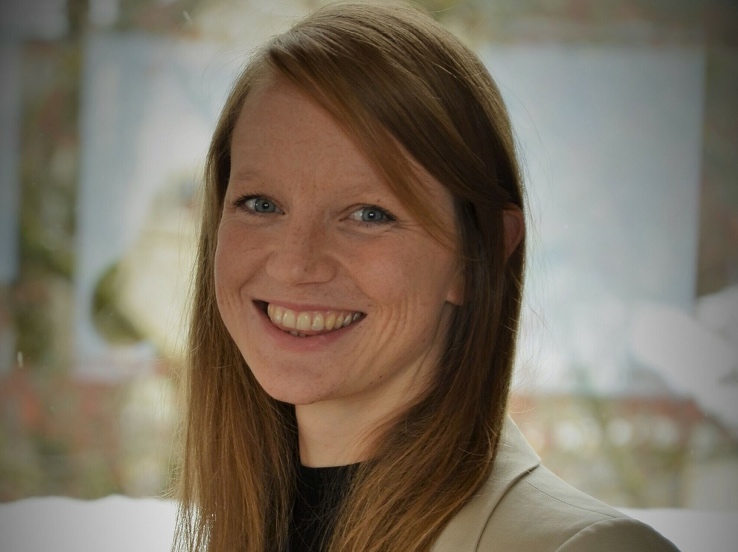
Katharina Erhardt is a professor at DICE, the Düsseldorf Institute for Competition Economics at Heinrich Heine University Düsseldorf, research affiliate at CESifo, and board member of the European Trade Study Group. Her research focus lies on public policy, especially international trade, economic geography, trade policy, and firms integration in international production networks. She obtained her PhD from ETH Zurich, and has stayed as a Postdoctoral Researcher at ETH Zurich and at Boston MIT. In Bielefeld, she gave a talk in the Economics seminar titled Go wide or go deep: Margins of new trade flows, and met with YWTS members from IMW. We discussed how she strategically planned her career path. This included choosing a PhD program rather than a doctoral researcher position as well as careful planning of the time between her doctorate and obtaining a tenured position. She highlighted the importance of having realistic and attractive outside options and setting interim goals. She further shared experiences from Berufungsverfahren, and from her leading position in the Ökonominnen-Netzwerk of the German Federal Ministry for Economic Affairs and Climate Action.
Katharina Erhardt is a professor at DICE, the Düsseldorf Institute for Competition Economics at Heinrich Heine University Düsseldorf, research affiliate at CESifo, and board member of the European Trade Study Group. Her research focus lies on public policy, especially international trade, economic geography, trade policy, and firms integration in international production networks. She obtained her PhD from ETH Zurich, and has stayed as a Postdoctoral Researcher at ETH Zurich and at Boston MIT. In Bielefeld, she gave a talk in the Economics seminar titled Go wide or go deep: Margins of new trade flows, and met with YWTS members from IMW. We discussed how she strategically planned her career path. This included choosing a PhD program rather than a doctoral researcher position as well as careful planning of the time between her doctorate and obtaining a tenured position. She highlighted the importance of having realistic and attractive outside options and setting interim goals. She further shared experiences from Berufungsverfahren, and from her leading position in the Ökonominnen-Netzwerk of the German Federal Ministry for Economic Affairs and Climate Action.

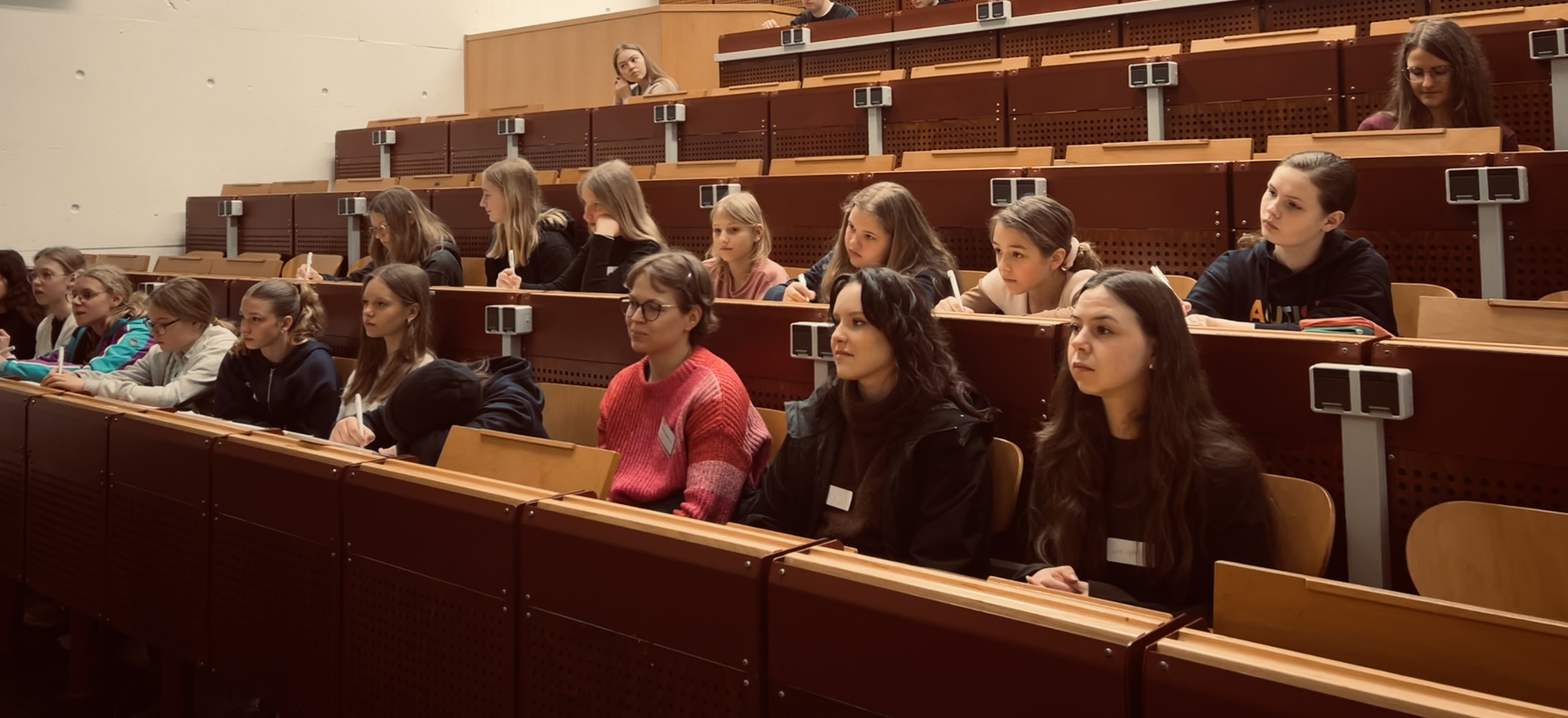
For the third time in a row, YWTS participated in Girls’Day, a Germany-wide initiative aimed at promoting STEM professions to girls. Twenty-six math-enthusiastic girls from high schools around Bielefeld were invited to get an impression of the daily life of a Mathematician or Economist. They started with a scavenger hunt through the library where they were challenged to find books in different categories like books by a female author or books written before 1900. Next, Professor Claudia Alfes answered their questions about what it is like to be a Mathematics professor and invited them to attend the start of her lecture on linear algebra. For the most part of the day, the girls were guided through a research question in a small group, each supervised by a female doctoral student. They discovered the mathematical phenomena of the card games Set and Dobble, calculated an ecological footprint, were introduced to best-reply strategies and proofs by induction in the game theory problem „Nim“ and discussed strategic as well as behavioral aspects of the Repeated Prisoners’ Dilemma. After lunch at mensa, each group presented their research questions and results to the others, in the spirit of attending a conference. The day ended with cake, lemonade, and playing with the games the other girls had worked on and presented.
For the third time in a row, YWTS participated in Girls’Day, a Germany-wide initiative aimed at promoting STEM professions to girls. Twenty-six math-enthusiastic girls from high schools around Bielefeld were invited to get an impression of the daily life of a Mathematician or Economist. They started with a scavenger hunt through the library where they were challenged to find books in different categories like books by a female author or books written before 1900. Next, Professor Claudia Alfes answered their questions about what it is like to be a Mathematics professor and invited them to attend the start of her lecture on linear algebra. For the most part of the day, the girls were guided through a research question in a small group, each supervised by a female doctoral student. They discovered the mathematical phenomena of the card games Set and Dobble, calculated an ecological footprint, were introduced to best-reply strategies and proofs by induction in the game theory problem „Nim“ and discussed strategic as well as behavioral aspects of the Repeated Prisoners’ Dilemma. After lunch at mensa, each group presented their research questions and results to the others, in the spirit of attending a conference. The day ended with cake, lemonade, and playing with the games the other girls had worked on and presented.

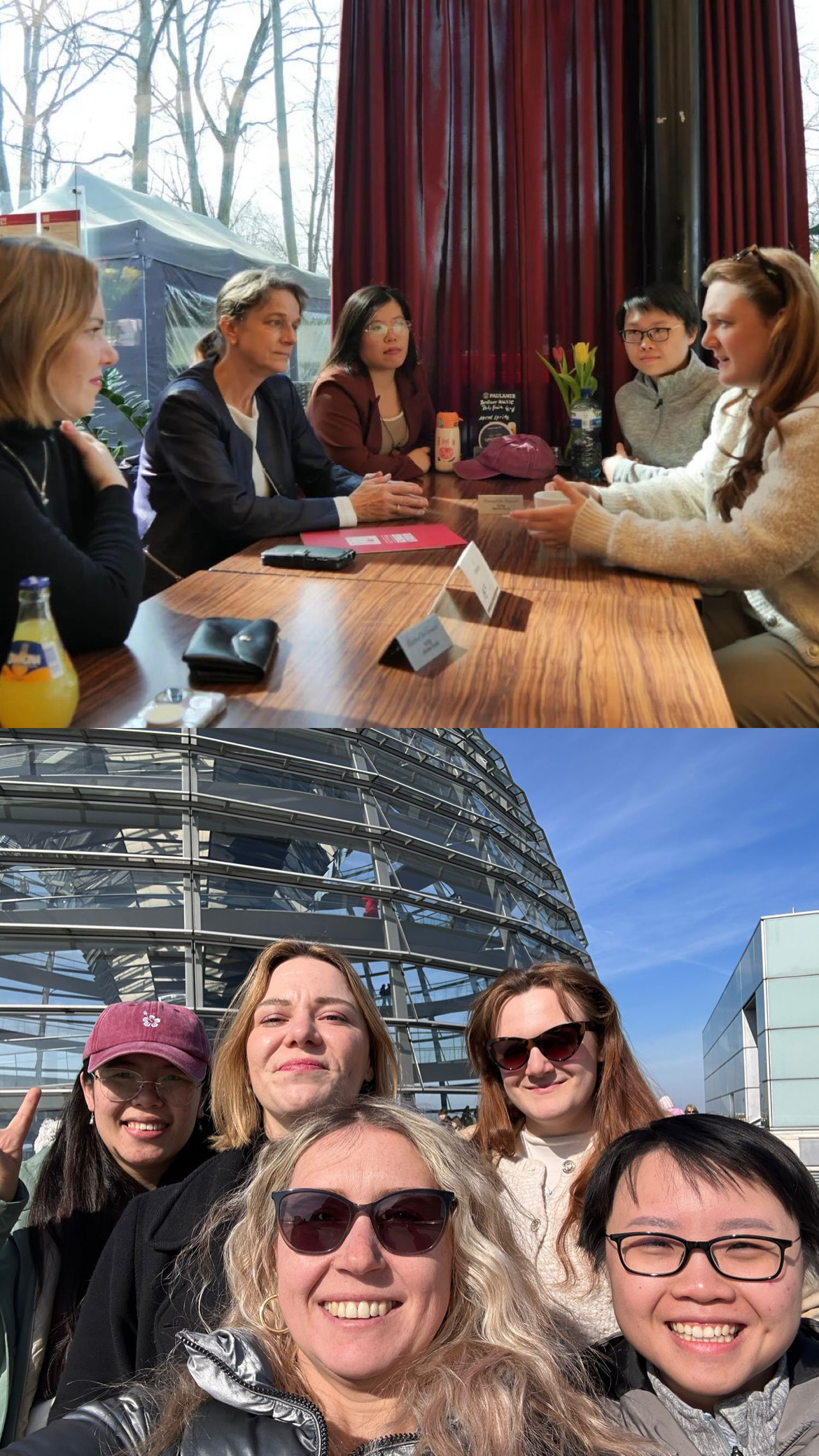
A group of YWTS students, doctoral candidates, and PostDocs went on a two-day excursion to Berlin. At the Weierstraß Insititute for Applied Analysis and Stochastics (WIAS), they attended the opening of the Iris Runge Program, a program designed to promote the career development of female scientists and enable them to remain in science. Mathematics historian Dr. habil. Renate Tobies talked about about the namesake Iris Runge who was one of the first female mathematics professors in Germany, and the two female postdocs supported by the program, Dr. Jin Yan and Dr. Anieza Maltsi, gave an overview of their research on random dynamical systems and on photoacoustic imaging. The day at WIAS ended with a visit to the exhibition “Women of Mathematics from around the World” and discussions with institute members. On the next day, the group was invited to a tour at Deutscher Bundestag and to have lunch with Dr. Anne-Monika Spallek, MdB (Bündnis 90/Die Grünen). She shared how her PhD in mathematics helped her in her work as a politician, and asked how politicians like her could support young female researchers. The trip also allowed for a stroll through Berlin along monuments in Mitte and Kreuzberg, including the Holocaust Memorial and East Side Gallery.
A group of YWTS students, doctoral candidates, and PostDocs went on a two-day excursion to Berlin. At the Weierstraß Insititute for Applied Analysis and Stochastics (WIAS), they attended the opening of the Iris Runge Program, a program designed to promote the career development of female scientists and enable them to remain in science. Mathematics historian Dr. habil. Renate Tobies talked about about the namesake Iris Runge who was one of the first female mathematics professors in Germany, and the two female postdocs supported by the program, Dr. Jin Yan and Dr. Anieza Maltsi, gave an overview of their research on random dynamical systems and on photoacoustic imaging. The day at WIAS ended with a visit to the exhibition “Women of Mathematics from around the World” and discussions with institute members. On the next day, the group was invited to a tour at Deutscher Bundestag and to have lunch with Dr. Anne-Monika Spallek, MdB (Bündnis 90/Die Grünen). She shared how her PhD in mathematics helped her in her work as a politician, and asked how politicians like her could support young female researchers. The trip also allowed for a stroll through Berlin along monuments in Mitte and Kreuzberg, including the Holocaust Memorial and East Side Gallery.

YWTS, in cooperation with UNIFILM Science Cinema, will host a screening of the movie "Picture a Scientist" on January 22nd at 6:30 p.m. The film tells the stories of four women who fight for equality, visibility and diversity in science; more information here: https://www.pictureascientist.com/.
The screening will be followed by a discussion about a working culture that fosters women doing research and the power of solidarity. Participants are Prof. Dr. Alexandra Kaarsch (Vice-Rector for Science and Society), Prof. Dr. Ana Botéro (Professor of Mathematics), Dr. Ulrike Haake (Managing Director BiGSEM & CeUS). The event will be moderated by Anna Hager (Coordinator YWTS and PhD student at IMW).
Afterwards, the participants will be available to continue the discussion in front of the lecture hall; some snacks and drinks are provided. The event is open to the public and free of charge.
YWTS, in cooperation with UNIFILM Science Cinema, will host a screening of the movie "Picture a Scientist" on January 22nd at 6:30 p.m. The film tells the stories of four women who fight for equality, visibility and diversity in science; more information here: https://www.pictureascientist.com/.
The screening will be followed by a discussion about a working culture that fosters women doing research and the power of solidarity. Participants are Prof. Dr. Alexandra Kaarsch (Vice-Rector for Science and Society), Prof. Dr. Ana Botéro (Professor of Mathematics), Dr. Ulrike Haake (Managing Director BiGSEM & CeUS). The event will be moderated by Anna Hager (Coordinator YWTS and PhD student at IMW).
Afterwards, the participants will be available to continue the discussion in front of the lecture hall; some snacks and drinks are provided. The event is open to the public and free of charge.
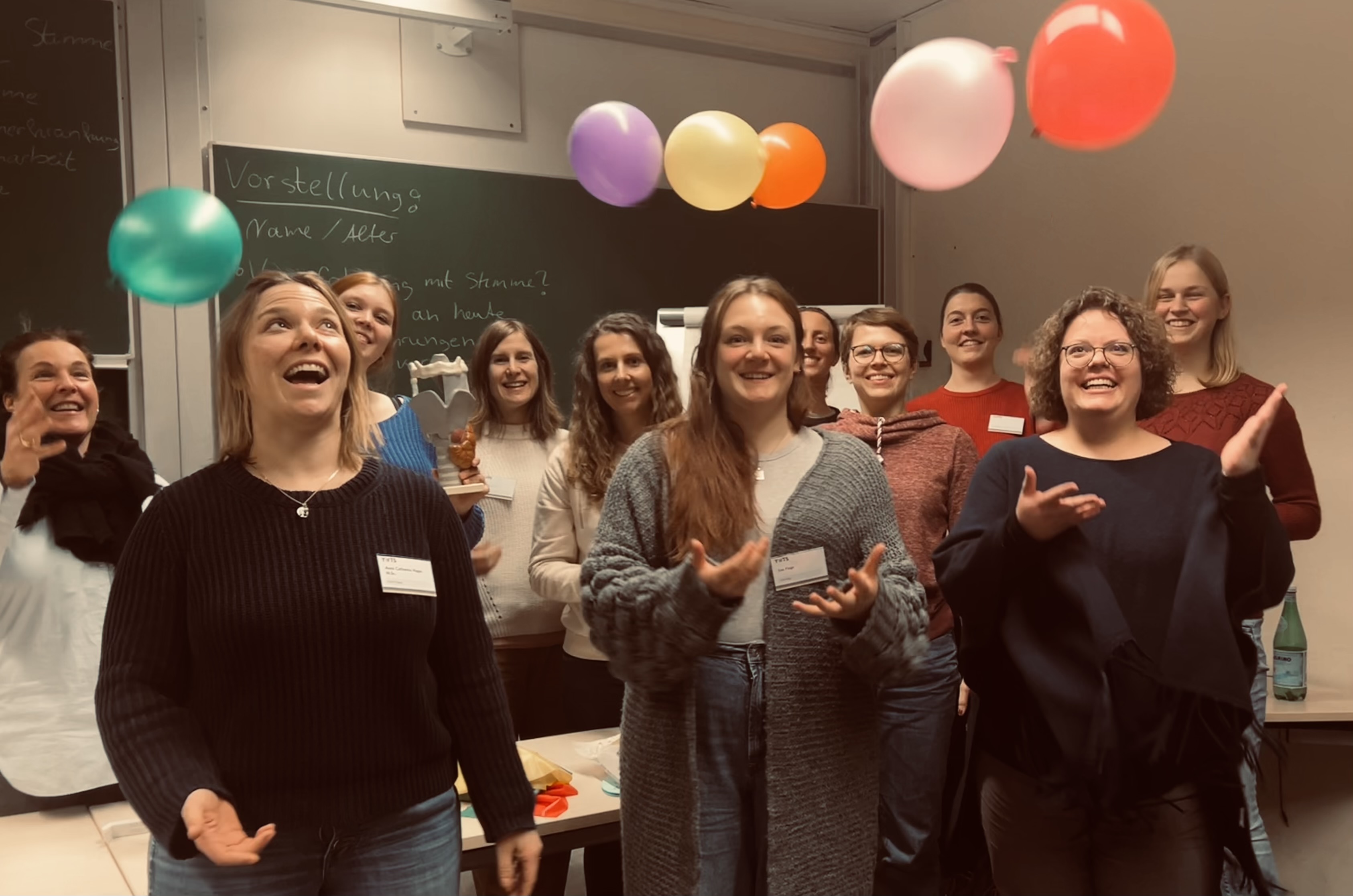
Every semester, YWTS offers a soft skill training. In winter term 23/24, we offered a 1-day voice training to students, doctoral candidates, and PostDocs. In the morning, we learned about functions of the voice, goals of voice work, and vocal hygiene and did physical exercises to get a feeling for the position of the larynx, increase the resonance of our voice, and to learn supportive breathing techniques. In the afternoon, we continued with exercises for a good speaking posture, and how to find your perfect pitch where your voice is most clear and most effortless at the same time. The workshop closed with tips for emergencies like when your voice is strained or when you are nervous about giving a talk.
The training was hosted by the very friendly and enthusiastic Janin Schröder-Hoppe and Sabrina Dehne from Logopädie Lemgo. Thanks to their many years of collaboration with the PEP network, they know how to provide targeted support for female scientists and students.
Every semester, YWTS offers a soft skill training. In winter term 23/24, we offered a 1-day voice training to students, doctoral candidates, and PostDocs. In the morning, we learned about functions of the voice, goals of voice work, and vocal hygiene and did physical exercises to get a feeling for the position of the larynx, increase the resonance of our voice, and to learn supportive breathing techniques. In the afternoon, we continued with exercises for a good speaking posture, and how to find your perfect pitch where your voice is most clear and most effortless at the same time. The workshop closed with tips for emergencies like when your voice is strained or when you are nervous about giving a talk.
The training was hosted by the very friendly and enthusiastic Janin Schröder-Hoppe and Sabrina Dehne from Logopädie Lemgo. Thanks to their many years of collaboration with the PEP network, they know how to provide targeted support for female scientists and students.

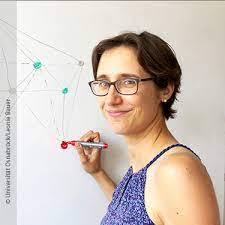
Professor Martina Juhnke held a talk titled „An expedition through Ehrhart theory“ in the Mathematics Colloquium on November 23d. She also took some time for a coffee break with some YWTS members during her day trip to Bielefeld. Martina Juhnke currently holds the chair for Discrete Mathematics at University of Osnabrück where she conducts research about algebraic and topological combinatorics. She obtained her PhD in Marburg and Cornell, and then held positions in Reykjavik, Vienna, and Frankfurt am Main.
In the „Meet & Greet“, Martina Juhnke shared how she decided to take on a new academic position throughout her career, and why she appreciates her experiences different universities in different countries with different cultures. She also talked about her process of growing into the role of a PhD supervisor, and how her being a woman played a role. Her advice for young female researchers was to never be afraid of academic hierarchies and to always have confidence in your skills.
Professor Martina Juhnke held a talk titled „An expedition through Ehrhart theory“ in the Mathematics Colloquium on November 23d. She also took some time for a coffee break with some YWTS members during her day trip to Bielefeld. Martina Juhnke currently holds the chair for Discrete Mathematics at University of Osnabrück where she conducts research about algebraic and topological combinatorics. She obtained her PhD in Marburg and Cornell, and then held positions in Reykjavik, Vienna, and Frankfurt am Main.
In the „Meet & Greet“, Martina Juhnke shared how she decided to take on a new academic position throughout her career, and why she appreciates her experiences different universities in different countries with different cultures. She also talked about her process of growing into the role of a PhD supervisor, and how her being a woman played a role. Her advice for young female researchers was to never be afraid of academic hierarchies and to always have confidence in your skills.

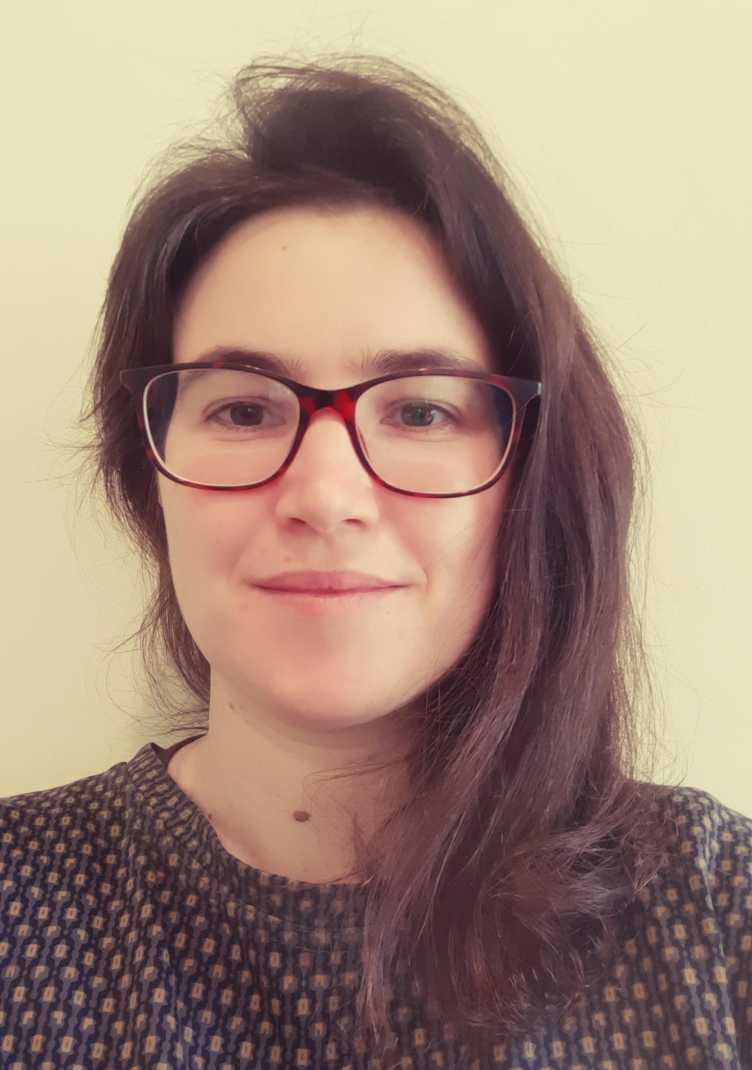
The first YWTS “Meet and Greet a Female Scientist” in winter term 23/24 took place with guest Dr. Marta Spinelli. Marta Spinelli is a Physicist at University Côte d’Azur in Nice with a focus on Particle Physics and Astrophysics. Previously she has worked at ETH Zurich, University of the Western Cape (South Africa), and at the National Institute of Astrophysics in Triest. She was invited to Bielefeld to give a talk in the Physics Colloquium on “Unveiling the dark Universe with Neutral Hydrogen. On that occasion, she sat down for coffee and a chat with a group of YWTS members from the Economics and the Physics department.
She shared how she experienced living in so many different countries, and we discussed if moving affects having a family, and if this is different for men and women. Also, we talked about situations where a gender bias might occur, e.g., when a female researcher is holding lectures or when a female student is taking an oral exam. The In winter term 2024, the YWTS “Meet & Greet” series will next feature Mathematician Martina Juhnke from the Mathematics department, and Economist Iris Kesternich.
The first YWTS “Meet and Greet a Female Scientist” in winter term 23/24 took place with guest Dr. Marta Spinelli. Marta Spinelli is a Physicist at University Côte d’Azur in Nice with a focus on Particle Physics and Astrophysics. Previously she has worked at ETH Zurich, University of the Western Cape (South Africa), and at the National Institute of Astrophysics in Triest. She was invited to Bielefeld to give a talk in the Physics Colloquium on “Unveiling the dark Universe with Neutral Hydrogen. On that occasion, she sat down for coffee and a chat with a group of YWTS members from the Economics and the Physics department.
She shared how she experienced living in so many different countries, and we discussed if moving affects having a family, and if this is different for men and women. Also, we talked about situations where a gender bias might occur, e.g., when a female researcher is holding lectures or when a female student is taking an oral exam. The In winter term 2024, the YWTS “Meet & Greet” series will next feature Mathematician Martina Juhnke from the Mathematics department, and Economist Iris Kesternich.

Please note that BGTS is offering financial support to go abroad, either to a conference or for a research stay. If you are curious, YWTS members have been abroad with BGTS funding and will gladly answer your questions. You can find their names and reports on the website. Application deadline for both fundings is 15 November 2023.
Please note that BGTS is offering financial support to go abroad, either to a conference or for a research stay. If you are curious, YWTS members have been abroad with BGTS funding and will gladly answer your questions. You can find their names and reports on the website. Application deadline for both fundings is 15 November 2023.
YWTS highly recommends to check out Bielefeld university’s female mentoring program movement. It is a directed at female students and young researchers at Bielefeld University. Application deadline for the mentoring period March 2024 – March 2025 is 27 October 27 2023. You can find more information here!
YWTS highly recommends to check out Bielefeld university’s female mentoring program movement. It is a directed at female students and young researchers at Bielefeld University. Application deadline for the mentoring period March 2024 – March 2025 is 27 October 27 2023. You can find more information here!
Mathematics professor Dr. Claudia Alfes-Neumann initiated the YWTS networks series “Coffee for female mathematicians”. She was interviewed for Uni Bielefeld’s website about her research and her vita. With respect to being a women in academia she shared:
‘Mathematics is still a male-dominated field. In my own studies, I was in my fourth year before a female lecturer taught me for the first time,’ says Alfes-Neumann. She thinks it’s important to better connect women in science: ‘That will provide more opportunities to also talk about personal experiences—for example, what it’s like to become a mother as a postdoc.’
You can read the whole article here:
https://aktuell.uni-bielefeld.de/2023/08/29/magic-equations/?lang=en
Mathematics professor Dr. Claudia Alfes-Neumann initiated the YWTS networks series “Coffee for female mathematicians”. She was interviewed for Uni Bielefeld’s website about her research and her vita. With respect to being a women in academia she shared:
‘Mathematics is still a male-dominated field. In my own studies, I was in my fourth year before a female lecturer taught me for the first time,’ says Alfes-Neumann. She thinks it’s important to better connect women in science: ‘That will provide more opportunities to also talk about personal experiences—for example, what it’s like to become a mother as a postdoc.’
You can read the whole article here:
https://aktuell.uni-bielefeld.de/2023/08/29/magic-equations/?lang=en
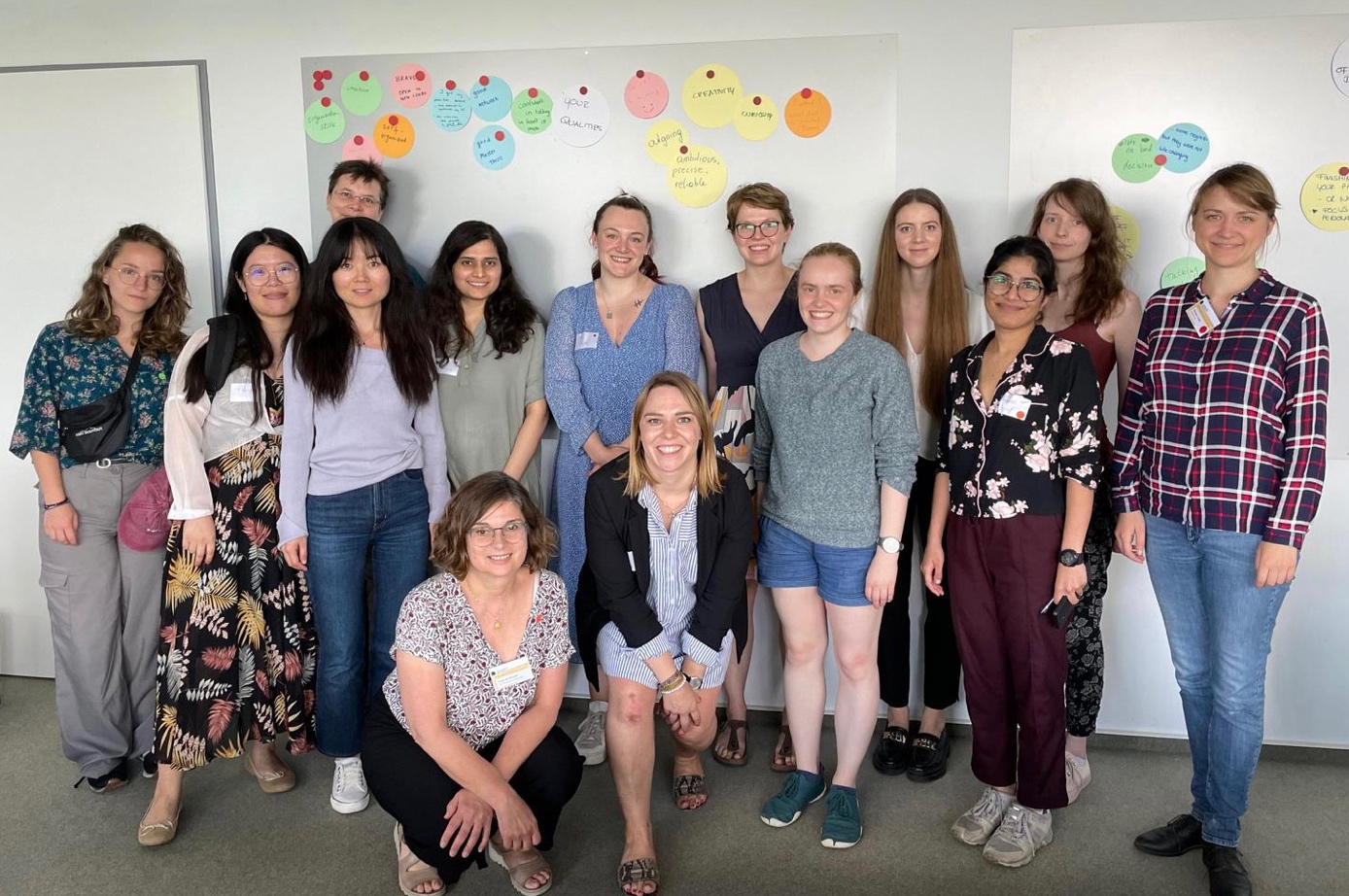
During SFB 1283’s Conference on “SPDEs, Optimal Control and Mean Field Games’’, YWTS coordinated a workshop on ‘”Taming Uncertainty: How to Address Self-Doubt as a Female Scientist’’. In small groups, invited speakers and participants of the conference as well as YWTS member shared how they dealt with moments of self-doubt and how they made tough decision. A variety of coping strategies was discussed; with the most popular ones being asking for help and discussing the situation with friends or family. The workshop closed with everyone naming one positive and distinguishing quality about themselves. It was nice to see the diversity in the answers, e.g., being creative, outgoing, brave, self-organized, confident in talking in front of others, having received great feedback in the past, relying on a good network, and being able to do what you enjoy: working in academia.
During SFB 1283’s Conference on “SPDEs, Optimal Control and Mean Field Games’’, YWTS coordinated a workshop on ‘”Taming Uncertainty: How to Address Self-Doubt as a Female Scientist’’. In small groups, invited speakers and participants of the conference as well as YWTS member shared how they dealt with moments of self-doubt and how they made tough decision. A variety of coping strategies was discussed; with the most popular ones being asking for help and discussing the situation with friends or family. The workshop closed with everyone naming one positive and distinguishing quality about themselves. It was nice to see the diversity in the answers, e.g., being creative, outgoing, brave, self-organized, confident in talking in front of others, having received great feedback in the past, relying on a good network, and being able to do what you enjoy: working in academia.

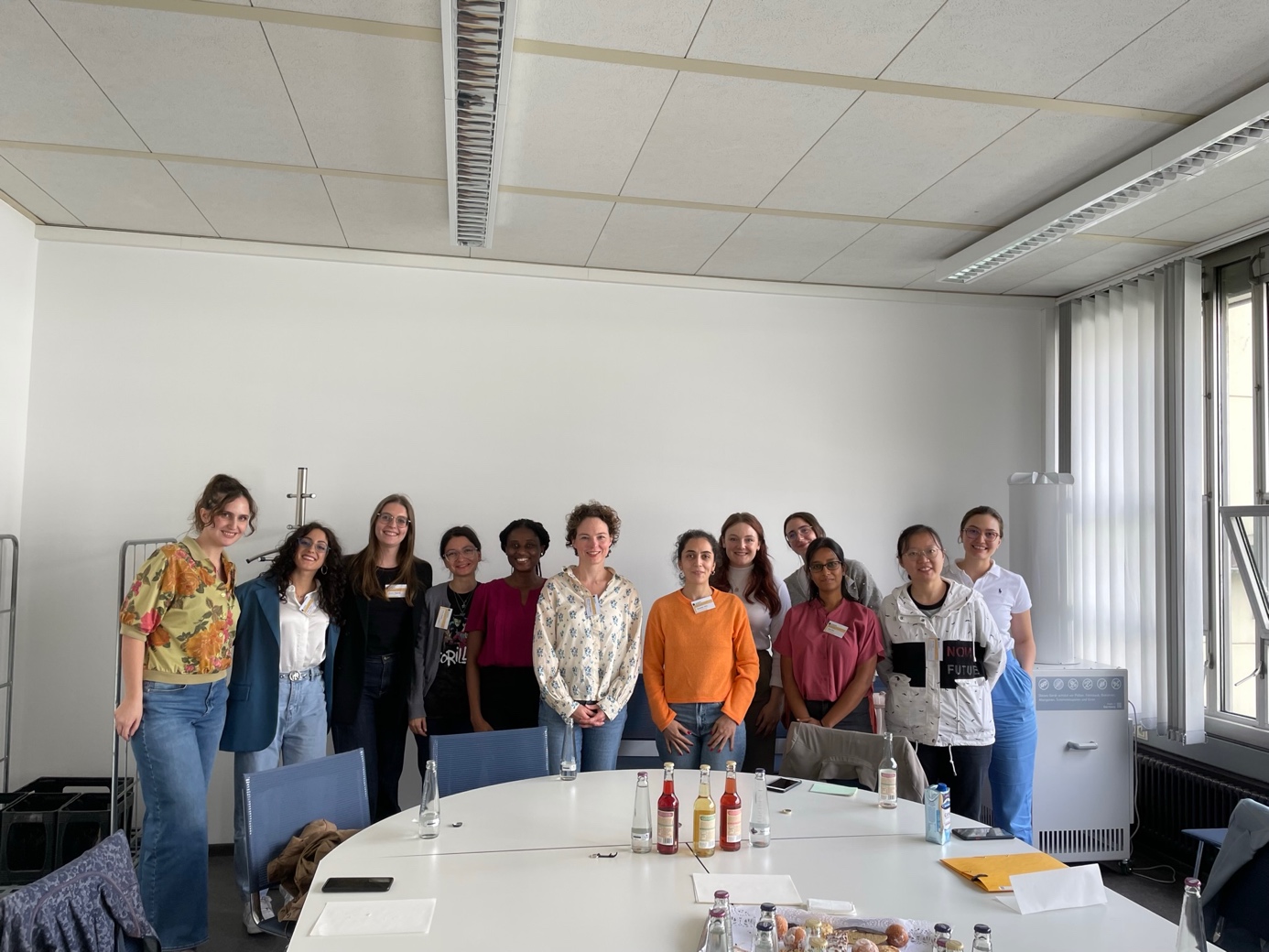
During the SFB 1283 summer school "Risk and Uncertainty in Economics, Insurance and Finance", YWTS organized a mentoring session around the theme "Talking to my Younger Self", directed at female summer school participants and YWTS members. In a guided discussion, Toulolpe Fadina, PhD (University of Essex) and Prof. Dr. Maren Schmeck (Bielefeld University) reflected upon their past and what advice they would like to give to their younger selves. They shared how they made career decisions, and which resources helped them to do so. The session closed with thoughts on how academia could become a more supporting environment for women. In the evening, the discussion was continued over dinner at Bernstein.
During the SFB 1283 summer school "Risk and Uncertainty in Economics, Insurance and Finance", YWTS organized a mentoring session around the theme "Talking to my Younger Self", directed at female summer school participants and YWTS members. In a guided discussion, Toulolpe Fadina, PhD (University of Essex) and Prof. Dr. Maren Schmeck (Bielefeld University) reflected upon their past and what advice they would like to give to their younger selves. They shared how they made career decisions, and which resources helped them to do so. The session closed with thoughts on how academia could become a more supporting environment for women. In the evening, the discussion was continued over dinner at Bernstein.

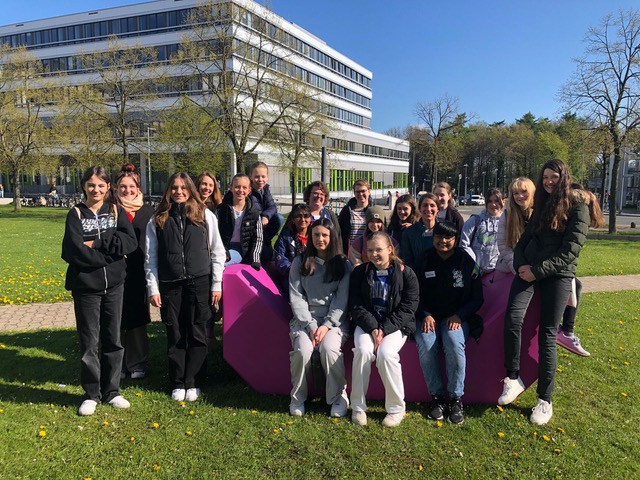
For Girls’ Day 2023, 14 math-enthusiastic high school girls from Bielefeld and the surrounding area visited Bielefeld University to gain an insight into theoretical sciences. At the side of (post)doctoral students, they immersed into the life of a young scientist for one day. First thing in the morning, girls and researchers got to know each other by sharing why they are passionate about maths. Next, the girls were kindly invited to ask questions to Jr.-Prof. Lukas Kühne and attend the beginning of his lecture on Linear Algebra I. The girls then spent most of the day in groups of 3, supervised by 1 or 2 YWTS members, to puzzle over a variety of mathematical problems in a playful way. They conducted experiments on probability by throwing dice, investigated the Birthday Paradoxon, and played with the card game Set and the tower of Hanoi to question and understand mathematical patterns in their everyday lives. Finally, each group presented their results to the others to simulate attending a conference. In that spirit, the day ended with some networking while eating cake and playing the games that had been explored during the day.
For Girls’ Day 2023, 14 math-enthusiastic high school girls from Bielefeld and the surrounding area visited Bielefeld University to gain an insight into theoretical sciences. At the side of (post)doctoral students, they immersed into the life of a young scientist for one day. First thing in the morning, girls and researchers got to know each other by sharing why they are passionate about maths. Next, the girls were kindly invited to ask questions to Jr.-Prof. Lukas Kühne and attend the beginning of his lecture on Linear Algebra I. The girls then spent most of the day in groups of 3, supervised by 1 or 2 YWTS members, to puzzle over a variety of mathematical problems in a playful way. They conducted experiments on probability by throwing dice, investigated the Birthday Paradoxon, and played with the card game Set and the tower of Hanoi to question and understand mathematical patterns in their everyday lives. Finally, each group presented their results to the others to simulate attending a conference. In that spirit, the day ended with some networking while eating cake and playing the games that had been explored during the day.

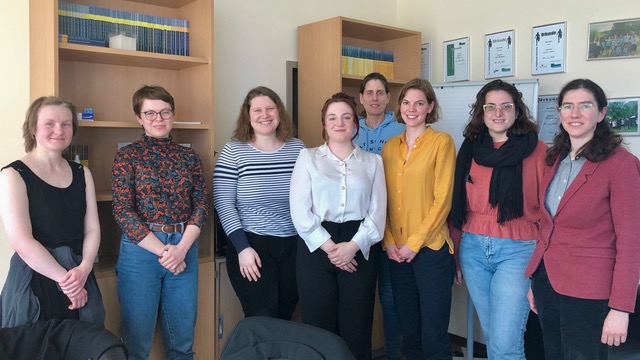
The British mathematician and economist Prof. Elizabeth Baldwin presented her paper „Implementing Walrasian Equilibrium: the Language of Product-Mix Auctions“ in the BiGSEM Economics Seminar on April 4th, 2023. She accepted the invitation to join YWTS members for a Meet & Greet over coffee on the occasion of her visit to Bielefeld University. She guided us through her academic path and shared her experiences as a researcher at Oxford University and as a working new-mom. One of the most interesting stories was why she decided to do a PhD in economics after obtaining a PhD in mathematics. The informal discussion ended on a high note: Prof. Baldwin’s experiences as a women in male dominated fields are consistently positive throughout her entire academic career.
The British mathematician and economist Prof. Elizabeth Baldwin presented her paper „Implementing Walrasian Equilibrium: the Language of Product-Mix Auctions“ in the BiGSEM Economics Seminar on April 4th, 2023. She accepted the invitation to join YWTS members for a Meet & Greet over coffee on the occasion of her visit to Bielefeld University. She guided us through her academic path and shared her experiences as a researcher at Oxford University and as a working new-mom. One of the most interesting stories was why she decided to do a PhD in economics after obtaining a PhD in mathematics. The informal discussion ended on a high note: Prof. Baldwin’s experiences as a women in male dominated fields are consistently positive throughout her entire academic career.

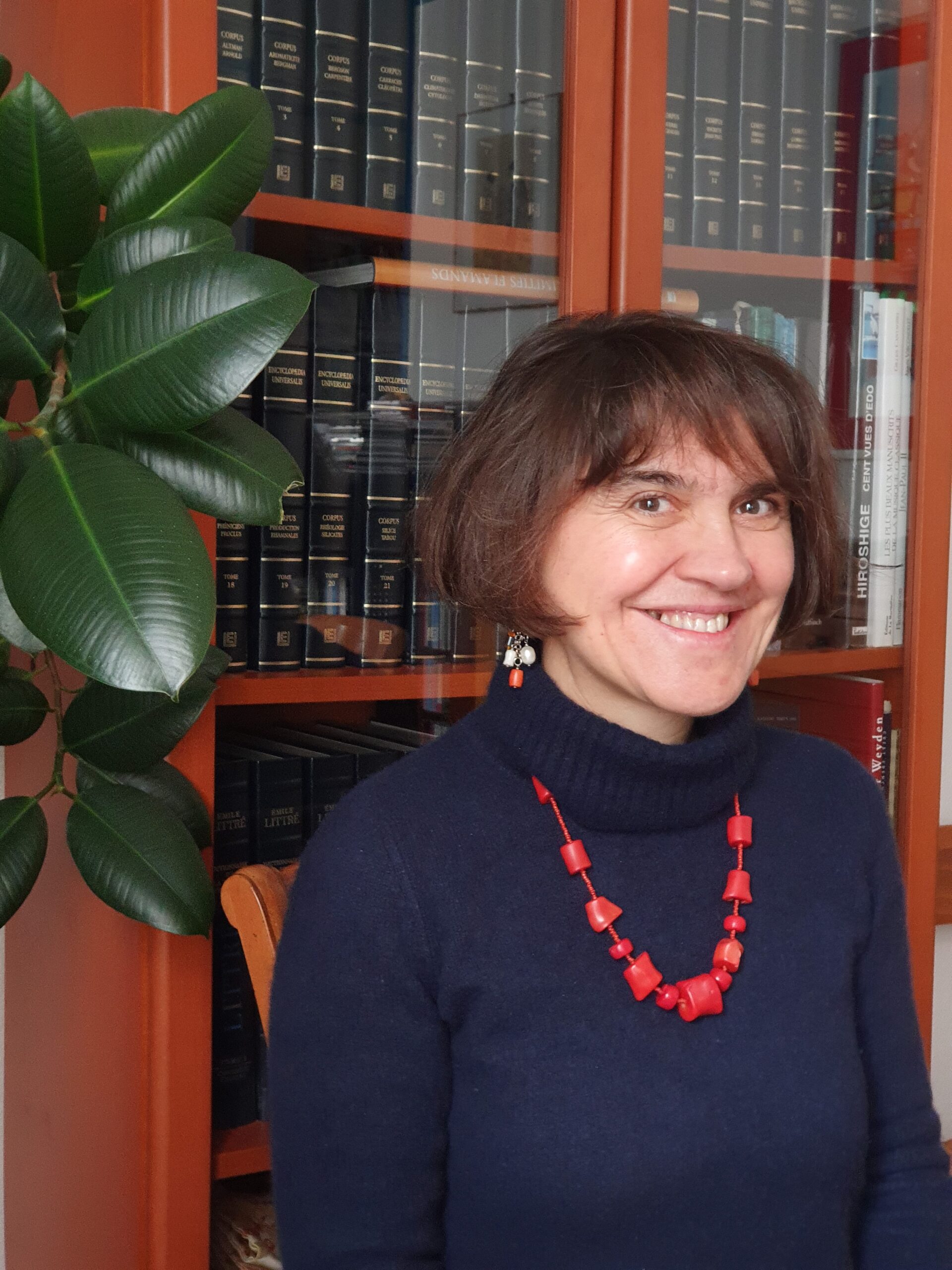
In winter term 22/23, the Faculty of Economics welcomed Prof. Dr. Agnieszka Rusinowska as gender guest professor. She conducts research Game Theory and Microeconomic Theory at Université Paris 1 Panthéon-Sorbonne, CNRS. Her December '22 visit to Bielefeld University was launched with a talk in the BiGSEM Economics Seminar "On the Design of Public Debate in Social Networks." In a joint interview, Prof. Agnieszka Rusinowska and Prof. Dominik Karos (Bielefeld University) discussed about gender equality in science. In another event, she openly addressed economics students’ questions about how to become a professor. During a second visit in January '23, Agnieszka Rusinowska held a talk on "Gender - Individualization - Environment“. In the event series YWTS Meet&Greet, she gave advice to female doctoral students by reflecting upon her career path. Finally, she gave a lecture on "Networking - A key competence“.
In winter term 22/23, the Faculty of Economics welcomed Prof. Dr. Agnieszka Rusinowska as gender guest professor. She conducts research Game Theory and Microeconomic Theory at Université Paris 1 Panthéon-Sorbonne, CNRS. Her December '22 visit to Bielefeld University was launched with a talk in the BiGSEM Economics Seminar "On the Design of Public Debate in Social Networks." In a joint interview, Prof. Agnieszka Rusinowska and Prof. Dominik Karos (Bielefeld University) discussed about gender equality in science. In another event, she openly addressed economics students’ questions about how to become a professor. During a second visit in January '23, Agnieszka Rusinowska held a talk on "Gender - Individualization - Environment“. In the event series YWTS Meet&Greet, she gave advice to female doctoral students by reflecting upon her career path. Finally, she gave a lecture on "Networking - A key competence“.

Discover consulting as a possible career path after your PhD.
Monthly Coffee Break for women in theoretical sciences. Please note that on January 26th 2023, we meet at 4 p.m. instead of 3:30 p.m.!
With Gender Guest Professor Agniezka Rusinowska
Monthly Network Lunch for women in theoretical sciences
Dinner, Drinks, and Workshop "Qualities and Skills my PhD taught me" with YWTS Alumnae
With Ass.-Prof. Galit Golan-Ashkenazi, followed by Christmas Market Visit
Meet and Greet a Female Scientist with Prof. Viola Priesemann
Theoretical Science Slam and Bowling Night
Hike through Teutoburger Forest, followed by Dinner
Monthly Network Lunch for women in theoretical sciences
Dinner, Drinks and Discussion „Career paths after a PhD“ with YWTS Alumnae
Monthly Network Lunch for women in theoretical sciences
Coffee Break for women in the mathematics department
Zum Girls' Day 2022 waren zwölf Mathe-begeisterte Schülerinnen aus Bielefeld und Umgebung an der Universität Bielefeld zu Besuch um einen Einblick in die theoretischen Wissenschaften zu gewinnen. […] Zum Text.
If you know kids in grade 5-13, we kindly ask you to share our offer with them and their friends! If you are happy to do so, please contact us so we can provide you with posters and/or flyers. Moreover, please get in touch with us if you would like to know more about our offer, or be involved in the preparations. E.g., we are curious about your ideas or previous experiences regarding the organization of such a program where researchers present their work and everyday life to kids.
Zur selbstbewussten jungen Wissenschaftlerin in 2 Tagen
with Gender Guest Professor Dr. Sabine Koeszegi (TU Vienna):
“I am me! How women negotiate their professional identity in science.”
Coffee Break for women in the mathematics department
Monthly Network Lunch for women in theoretical sciences
Coffee Break for women in the mathematics department
Introduction new coordinators & discussion of upcoming events
Regular online meeting to exchange experiences and information on topics such as "successful home-office", "application processes in science", "networking on online conferences" or to discuss some concrete mathematical problem in an informal setting.
Regular online meetings to exchange experiences and information on topics such as "successful home-office", "application processes in science", "networking on online conferences" or to discuss some concrete mathematical problem in an informal setting.
Everyone’s warmly invited to attend the talk.
